























by harsh new budgetary measures that are making an already dire situation even worse
The recent increases to the National Insurance contributions (NIC) the reduction in the threshold for employers contributions and hikes to the National Minimum Wage are squeezing providers harder than ever
These policies, implemented without sufficient counterbalancing funding have led the sector to launch a petition with over 17 500 signatures and to join a growing movement led by Providers Unite a grassroots campaign to rally adult care providers across the UK in calling for an urgent review of recent Budget measures
Providers Unite, in a letter addressed to Chancellor Rachel Reeves, emphasized the urgency of their call for action voicing concerns shared by thousands in the industry
In my view, these budgetary changes could well create an economic catastrophe on par with the one that led to the abrupt exit of Liz Truss and her Chancellor This administration’s lack of commercial and business experience is painfully evident and we are now paying the price For years the care sector has struggled with limited funding battling to provide quality services against a backdrop of staffing shortages and skyrocketing recruitment costs To make this more expensive without any increased financial support from the government is nothing short of folly and the warning signs could not be clearer
This is not just a disaster for the care sector; we also produce a publication for the hospitality industry the third largest employer in the country contributing £93 billion to the economy and £54 billion in tax receipts and a sector facing similar existential threats
The hospitality sector is warning of potential mass closures and widespread job losses if these measures are not reversed This industry is a major contributor to national tax revenues without which the government s plans for public services are unsustainable We’re calling on Chancellor Reeves to act now before the consequences become irreversible
On a side note, we at The Carer, are deeply touched by the many heartfelt Remembrance Day stories we ve received from care homes across the UK
These stories are a powerful reminder of the sector’s unwavering dedication to honouring our past and providing exceptional service to those in need Once again the care sector has shown how much it cares for the nation particularly on this special day of
remembrance We extend our sincerest thanks to all who shared these touching tributes and continue to be inspired by the commitment shown to this deeply important tradition
As we reflect on both the past and the present, our message to policymakers remains simple: reverse course on these damaging budget measures or risk pushing two of the UK s most essential service sectors to breaking point

I can always be contacted at editor@thecareruk com and encourage our readers to sign up for our bi-weekly digital newsletter at www thecareruk com and follow us on social media for all the latest news
At THE CARER, we are calling on our readers for help
As you may have seen in our appeal for support, The CARER has always been delivered in print and online free of charge since 2004 including the sector's only weekly digital issue
We are committed to keeping you informed with the latest news views products and services on the sector s most popular adult social care website www thecareruk com , which receives almost 4,000 visits and 26,000 page reads every day

However, with costs rising significantly, we recently put out an appeal for support
We extend our heartfelt thanks to readers who have responded and pledged their support with a £10 donation covering the next two years, and thank you also for your very kind words of support too!
Your contributions are invaluable, and if you haven't yet pledged, please do consider supporting us so we can continue delivering quality content
For details on how to contribute please visit www.thecareruk.com/subscriptions/


The National Living Wage will increase by 6 7% for employees ages 21 and over and the National Minimum Wage will rise by 16 3% for 18-20 years olds and 18% for under-18s and apprentices
TARGETING 100,000 SIGNATURES
The petition has already passed 10 000 signatures, which requires a response from the Government, and currently stands at over 18 000 and now campaigners are targeting 100 000 signatures which would mean the petition would be considered for debate in Parliament
Petition author and Director of the Bay Care Group Katrina Hall said: “With providers already stretched thin the impact of this could compromise the quality and availability of care adding that councils may need to cover higher provider fees to ensure services continue, diverting resources This could create a counter-productive cycle where public funds are funnelled into covering shortfalls instead of building a sustainable care system
North Yorkshire social care providers have thrown their weight behind the petition and a national campaign urging the Government to rethink budget measures they fear will cause services to collapse
The Independent Care Group (ICG) which speaks for social care providers across North Yorkshire and York has signed the petition and has also signed up to the Providers Unite campaign which was launched yesterday (12 November)
GRASSROOTS CAMPAIGN
Providers Unite launched its grassroots campaign to unite adult care service providers across the country” and are calling on Chancellor Rachel Reeves for an “urgent review of recent Budget measures”, bringing together a coalition of more than 125 signatories as a network of care providers representing a workforce of 1 59 million and a sector contributing £68 1 billion annually to the national economy” saying that “without immediate intervention Britain faces the systematic collapse of community care services putting at risk the well-being of an estimated 1 2 million individuals who rely on these essential services
The coalition have signed an open letter addressed to Chancellor Rachel Reeves asking for:
An urgent commitment to mitigate the Budget s damaging impact on specialist care services for people with learning disabilities and autistic people
A cross-party collaboration to outline clear actionable sustainable plans for the future of the sector
• Combined the coalition of specialist care organisations:
Support 55 000 people
Employ 130 000 skilled care workers
Operate 7,000 publicly funded care homes
Represent both private and publicly funded services and large and small providers
SYSTEMIC COLLAPSE
Given existing social care funding constraints and warnings from Councils that fund this type of care
there is the letter says a shared concern amongst the providers about the impact of the Budget on the vulnerable people they support as well as ongoing attention paid to only one half of social care provision –elderly care – and not those with profound disabilities in need of lifelong care who are wholly publicly funded and therefore most impacted when public funding is squeezed
The signatories urgently call for the establishment of exemptions similar to those granted to the NHS or urgent adjustments to the Local Government Finance settlement to bridge this funding gap They say the alternative is nothing short of a systematic collapse of community care services across Britain
The letter has also been shared with Darren Jones MP Chief Secretary to the Treasury Wes Streeting MP Secretary of State for Health and Social Care Stephen Kinnock MP Minister of State for Care and Angela Rayner MP Secretary of State for Housing Communities and ICG Chair Mike Padgham said: Today is a pivotal day for adult social care and it is vital that we get the message across that these budget-driven increases could have devastating consequences for the safe delivery of care for hundreds of thousands of older vulnerable and disabled people
The Government has to act – either by reversing the National Insurance increase for our sector or by ring-fencing additional funding to help providers meet the increase and the wages rise next spring otherwise the result doesn t bear thinking about for social care in this country
He said the Government either had to make social care providers exempt from the National Insurance increase or ring-fence funding with local authorities that commission the bulk of care to pay for the rise
BREAKING POINT
Earlier this month a survey from the Association of Directors of Adult Social Care Services warned of a social care funding crisis as a report revealed that 81% of councils expect to overspend their adult social care budgets this year, up from 72% in 2023/24 with an estimated overspend on adult social care at £564 million
ADASS president Melanie Williams described the financial situation as being ‘at breaking point’
The report showed that 35% of councils – up from 19% in 2022 – were required to make further in-year savings on top of planned reductions, which were already at the highest level in eight years
There is a projected increase to £1 4 billion in required savings by 2025/26 the report said
Ms Williams said the increases in national insurance contributions (NIC) and national living wage (NLW) announced in the autumn Budget last week would add further pressure
She said the £600 million investment into social care also announced in the Budget would do little to help, as the money would be needed to fund NIC and NLW rises
‘This crisis is affecting councils up and down the country because budgets don’t reflect the cost of care and support for disabled and older people The Government know that to fix the NHS, they must sort social care We need reform, but right now, they must fully fund the increases in national living wage to keep the system afloat ’ said Ms Williams


The social care sector is experiencing one of its most transformative periods accelerated by technological advancements As digital tools and platforms reshape how care is managed and delivered providers are benefitting from enhanced transparency efficiency and personalisation
While many care providers have welcomed these advancements with open arms some in are just beginning to explore what digital transformation can mean for their care service As we look back over a decade of change it s clear that technology will continue to play a pivotal role in the next chapter of social care
Switching from paper systems to intuitive digital tools
For many years, paper-based systems were the cornerstone of the social care industry used to record care plans track client information, and manage daily tasks However, these manual processes came with inherent limitations such as challenges in data sharing inconsistent documentation and timeconsuming administrative tasks As the sector moved towards digital platforms many providers found that real-time data access enabled a significantly improved level of person-centred care With digital tools care providers can now update records on the go ensuring that all members of a care team have the most up-to-date information at any given moment This has not only streamlined operations but also positively contributed towards the continuity in care that simply wasn t possible before Care that s family-inclusive and transparent
One of the most significant changes technology has delivered to social care is the inclusion of families and support networks in the care journey Digital platforms have made it possible for family members to stay connected with the status and progress of their loved ones even from a distance Features such as openPASS the first family and friends portal of its kind promote transparency trust and empowerment by
By Robin Batchelor, Chairman & CEO of
everyLIFE Technologies (www everylifetechnologies com)
connecting care providers with the support network of those they care for This provides peace of mind and reassurance for families who are now better informed about the care their loved ones receive By bridging the gap between providers and families technology has transformed care from a solely professional service into a collaborative supportive network
Streamlining of administrative tasks
Administrative tasks have historically taken up a considerable amount of care providers’ time, often drawing attention away from direct, hands-on care Digital platforms have helped alleviate time spent by automating many of these tasks such as record-keeping compliance reporting and scheduling This shift has allowed care professionals to focus on what truly matters delivering exceptional care For example digital compliance tools can automatically track regulatory requirements and alert staff to any potential oversights making compliance management more efficient and less stressful By reducing the time spent on administration, technology has enabled providers to enhance service delivery
Challenges to adoption
Although we ve come a long way as a community over the past decade and demonstrated the clear benefits of technology the journey toward full digital adoption is not without its obstacles Some social care organisations face challenges such as budget constraints and limited digital literacy among staff
Additionally concerns over data privacy and cybersecurity remain high especially given the sensitive nature of health and care information Providers must promote a culture of collaboration that creates an environment welcoming technological advances and places support front and centre, to enhance overall care quality
As we reflect on a decade of technological innovation in social care it s clear that digital transformation is no longer just an option but a necessity for delivering high-quality person-centred care Technology has equipped providers with powerful tools to meet the growing demands of the industry As advancements in artificial intelligence, predictive analytics, and data connectivity continue to evolve, the future promises even greater opportunities for innovation By continuing to prioritise technology’s role in social care providers can set a new standard of excellence ensuring that everyone involved benefits from a more connected responsive and transparent care community
16th 2024 Hilda, a former district nurse with lifelong dedication to serving her community marked her centennial birthday surrounded by four generations of her loving family fellow residents and dedicated team at Thistle Court
Born on October 16 1924 in Cwm near Ebbw Vale Hilda has lived a
Aberbeeg Hospital in Abertillery As a district nurse Hilda served at coal mines and was one of the nurses involved in the Six Bells Colliery Disaster in June 1960 where she was brought in to be the head triage nurse Following this tragedy Hilda published her own poem called What Price Coal which reflects on the courage and resilience of mining communities For her special day Hilda requested 100 post cards to be sent to her which the home arranged and within days over 150 cards showed up from all over the world including Las Vegas Paris and Japan some with personalised messages wishing her a happy birthday and congratulating her on her achievement In honour of her milestone Hilda was celebrated by relatives across four
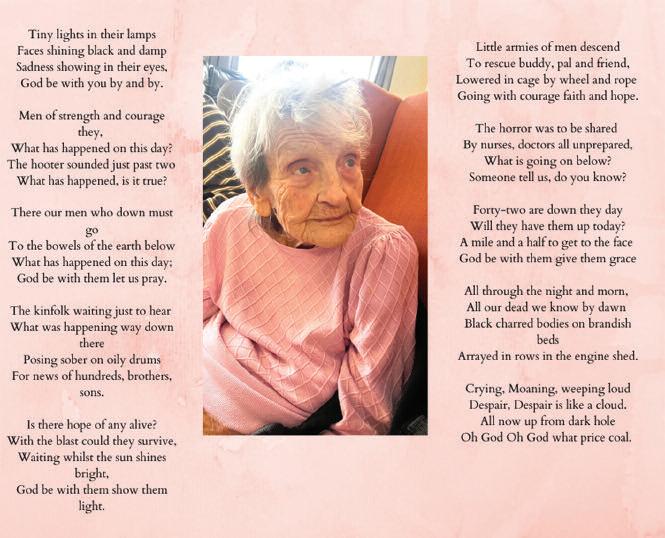
generations including her son Hedley granddaughter Helen and greatgrandson Acer, who joined her on this special day In addition to family and friends Hilda received a special birthday card from King Charles and Queen Camilla, a recognition she humbly cherished playfully noting I have survived even the Queen The home was transformed for the celebration with decorations and festivities creating a vibrant street party atmosphere throughout In true Thistle Court fashion members of our team who were off duty along with a few former team members, came in especially to celebrate with Hilda and wish her a happy birthday Sarah Butfield, Thistle Courts Home Manager said “We were proud and honoured to have the opportunity to support Hilda her family and friends in celebrating her 100th birthday The day was filled with laughter and a few tears whilst reminiscing about her life and nursing career The reading of her published poem What price Coal didn t leave a dry eye in the room Hilda is a truly inspirational woman and nurse ” As part of Thistle Courts values which celebrate the continuity of life and personal histories, Hilda is encouraged to honour her past and maintain her connections to nursing- a career she dedicated herself to for so many years She proudly keeps her nurse’s clock and book close, which serve as meaningful reminders of her journey and accomplishments Even today Hilda enjoys telling her nurses personal stories from her time as a nurse

New laws will give patients sectioned under the Mental Health Act more dignity and say over their care in long-awaited updates have been introduced in Parliament
Currently outdated laws do not meet modern standards and fail to give patients an adequate voice For example, individuals experiencing severe mental illness can be placed in police cells and the law automatically gives a patient s nearest relative – rather than the person of their choosing such as a partner – a say in decisions about their care
Patients currently have little say over their care and treatment should they be detained or over who should be involved in making decisions related to their care such as family members and carers
The new Mental Health Bill addresses the significant changes in attitudes towards mental illness since the original act was passed recognising that outdated laws around the treatment of people in a mental health crisis are no longer tolerable Modernising the bill was a manifesto commitment and will reform the existing Mental Health Act to make it fit for purpose improving patients experiences of hospital and mental health outcomes while also introducing stronger protections for patients, staff and the general public
This includes making it a legal requirement for each patient to have care and treatment plans tailored and shaped by their individual needs that will make clear what is needed to progress them to discharge The bill will also give patients the right to elect a person to represent their interests and greater access to advocacy when they are detained Together these reforms will make it more likely for patients to stay in contact with health services and continue to engage with treatment
As well as ensuring patients have a voice in their care the reforms also recognise the critical role that families and carers can play in keeping patients safe – providing insight and knowledge of a patient’s wishes and preferences and an understanding of what keeps them safe – including when a patient is too unwell to express this themselves The bill will strengthen the rights of families and carers through changes to the nominated person role and require clinicians to consult with others close to the patient as they make decisions around their care where appropriate or where the patient wishes
Police and prison cells will also no longer be used to place people experiencing a mental health crisis as well as creating more space for police forces to hold criminal suspects Instead, patients will be supported to access a suitable healthcare facility that will better support their needs
Secretary of State for Health and Social Care Wes Streeting said Our outdated mental health system is letting down some of the most vulnera-
ble people in our society and is in urgent need of reform
“By bringing the Mental Health Act in line with the 21st century we will make sure patients are treated with dignity and respect and the public are kept safe
“Safety is paramount, which is why the bill also includes measures to ensure patients staff and the general public are better protected The bill will improve decision making around detention discharge care and treatment As part of this, the bill will introduce a new requirement for the responsible clinician to consult another person before they discharge a patient Increased access to second opinion doctors will help ensure care is appropriate compassionate and effective Discharge processes will also be reviewed more broadly and will include a safety management plan for the patient to keep themselves and other safe
Claire Murdoch NHS National Mental Health Director said: This new Mental Health Act is a once in a generation opportunity to ensure that patients experiencing serious mental illness and crises receive safe modern evidence-based care and that the needs and wishes of patients and their loved ones are central to care and better mental health outcomes ”
“This comes alongside the NHS’s work to transform mental health services – either through intervening earlier with hundreds of NHS teams working in schools or trialling new 24/7 crisis mental health hubs to prevent people needing hospital care in the first place and if an admission to hospital is needed the health service is working with local services to ensure this is delivered in a safe and therapeutic environment close to people’s homes ”
An independent review of the Mental Health Act chaired by Professor Sir Simon Wessely President of the Royal Society of Medicine and commissioned by former Prime Minister Theresa May in 2017, found rising rates of detention under the act racial disparities and poor patient experience especially for autistic people and those with a learning disability
For those with a learning disability or autistic people the act will be amended to place a limit of 28 days for which they can be detained unless they have a co-occurring mental health condition
Professor Sir Simon Wessely Chair of the Independent Review of the Mental Health Act said “I am delighted that at long last a new Mental Health Act bill is to go before Parliament No one doubts that it is time to modernise our legislation in order to achieve the goal of reducing coercion and increasing choice for those who suffer from the most severe mental illnesses
Our reforms will achieve that by ensuring better treatment and discharge planning with more family involvement replacing outdated
Victorian rules and by reforming community treatment orders to tackle unacceptable ethnic differences Most of all, ensuring that more attention is given to patient preferences will improve compliance with essential treatment, reduce coercion, while still protecting the public where necessary
Reforms in the Mental Health Bill aim to improve patient experiences choice and autonomy as well as tackling racial discrimination and better supporting those with learning disabilities
THIS INCLUDES:
increasing the frequency of clinical reviews to better ensure that the treatment patients receive s appropriate updating the use of community treatment orders so that they are only used when appropriate and proportionate
• limiting the length of time that people with a learning d sability and/or autistic people can be detained under the act, if they do not have a cooccurring mental disorder that needs hospital treatment and have not committed a criminal offence
ending the use of police and prison cells for detaining someone experiencing a mental health crisis instead of getting them access to a facility where they can get the proper support such as a hospital speeding up transfers from pr son to hospital by limiting the time it can take to transfer prisoners who need treatment in a mental health hospital to a maximum of 28 days
Commenting on the announcement Mark Rowland Chief Executive at the Mental Health Foundation said: These long overdue updates to the Mental Health Act cannot come soon enough People need support that reflects our modern understanding of how to help and care for people during a mental health crisis – not our understanding 4 decades ago The original version of the act has driven racial disparities, stripped those who are sectioned of their humanity in a wholly unnecessary way, and all too often made crises worse ”
“We particularly welcome reforms to give greater say to patients such as granting people with severe mental health problems more control over who makes decisions for them during a crisis banning the use of police cells as places of safety for people experiencing a crisis and addressing the inappropriate use of community treatment orders which black people were 11 times more likely to receive We will look to work with the Department of Health and Social Care over the next weeks and months to help shape the Mental Health Bill and put dignity at the heart of how our public services support people experiencing a mental health crisis


Depending on your reason for using the internet a poor connection can range from a huge frustration through to loss of business however for those in the later living sector it can have a more profound impact
Over the past decade, the UK’s data consumption has skyrocketed by over 1600% reflecting our growing reliance on digital infrastructure Copper phone lines which have supported this connection until now are being phased out and replaced by fibre cables to support the network s capacity but with the January 2027 copper switch off looming those who haven’t implemented the last metre connections [kerb to door] for their properties will be left without adequate connection
This shift is not only concerned with keeping up with technological advancements; it’s about ensuring the safety and well-being of our most affected population The later-living sector is a crucial player when considering these required updates The sector mirrors the trend of increasing network usage with advanced medical technologies resident apps and the essential need for residents to stay connected with loved ones The seamless operation of last-resort emergency call systems and the smooth running of modern later-living facility technologies hinge on this critical upgrade The predominant issue is that this need

By Darren Zitren, partner
for change is not realised on the scale at which it will take for these key stakeholders to make the required plans and progress
For the later living sector and wider residential market the implications are profound Full fibre connections are essential for the sophisticated medical technologies that enhance resident care the apps that streamline operations and the connectivity that supports residents mental well-being These technologies include remote monitoring systems, telemedicine, and advanced diagnostic tools that require high-speed, reliable internet to function effectively Without full fibre these systems may experience delays or failures potentially compromising resident care Additionally, full fibre ensures that video calls, messaging apps, and social media platforms work seamlessly helping residents maintain these important relationships This connectivity is not just a luxury; it’s a fundamental part of modern care that supports mental health and reduces feelings of isolation
Real asset advisor Cluttons has evidenced this progress through its expertise in digital infrastructure solutions supporting care home providers smoothly through the upgrade For those with multiple portfolios it can be a laborious process that involves a lot of co-ordination and knowledge of planning and wayleaves and in many care homes it is being put on the “too difficult to deal with now” pile due to lack or resource
Conversely with the competitive landscape of the senior housing market technology strategies are being discussed in the boardroom without the realisation that they shortly will not have the infrastructure to support it
Whether technology is seen as lifesaving or life enhancing the copper switch off timer is ticking and action must be taken now
There is also a conversation to be had about ownership and responsibility of these upgrades ahead of the January 2027 cut off Where private land and councils are involved, there is a need for consultation about a programme to make the changes - effectively and in good time to minimise risk and safe homes



•
•
•
or



More people are receiving adult social care in England following years of decline official data has revealed Councils funded long-term care packages for 858,720 people during 2023-24, up 2 8% on the year before which in turn followed a 2 1% rise in 2022-23 according to NHS England’s annual adult social care activity and finance report
In the interim, the numbers receiving councilfunded long-term care in 2023-24 were at levels last seen in 2017-18 while authorities also boosted number of reablement packages last year following a rise in funding KEY ELEMENTS OF THE REPORT REVEAL: Gross
adult social care by
gross current expenditure was spent on long term support this has increased by £3 0 billion (16 2%) compared to 2022-23
In 2023-24 858 720 clients received long term care during the year This has increased by 23,385 clients (2 8%) since 2022-23 Overall the number of clients receiving long term care has decreased since 2015-16 This downward trend has been mainly driven by a decrease in clients aged 65 and over receiving long term care down 28,275 to 559,220 since 2015-16
For the second time, over 2 0 million (2 085 720) requests for adult social care support were received by local authorities This is equivalent to 5 715 requests for local authority support received per day in England by local authorities (up 230 requests per day on last year)
Local authorities reported reasons for the fluctuation since last year included services continue to be affected post-pandemic increased complexity of clients change in recording processes and case management systems and increased demand for services
“These alarming figures show state funded support for carers in England has nosedived in recent years,” said charity the Carers Trust’s director of policy and public affairs Dominic Carter
“This is a travesty at a time when carers are taking on ever more responsibility and facing burnout as they prop up a health and social care system that’s been starved of funding ”




By Sanctuary Care Activities
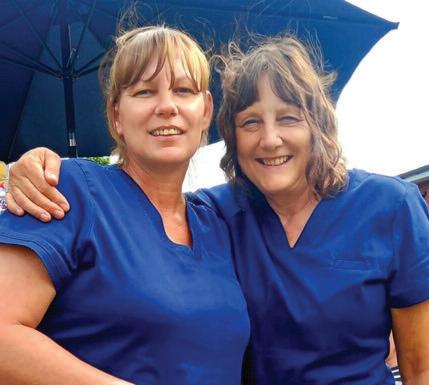
Intergenerational experiences are a great way of connecting older and younger generations, fostering mutual learning, community engagement and enhancing the wellbeing of all age groups
At Sanctuary Care we have built connections with many people in the communities surrounding our care homes which has helped to create a sense of belonging for both residents and the younger generation
Organising intergenerational experiences in a care home setting requires careful planning and collaboration Here s a guide on how to roll out such programmes effectively, with tips on building relationships with the community REACH OUT TO THE COMMUNITY
Establishing partnerships with organisations in your local community is key We connect with nurseries schools volunteer networks youth and parenting groups to plan regular visits that are mutually so beneficial


People from all age groups regularly come along to our homes, as we find that each age group offers something unique For residents these opportunities help to keep them connected to their local communities whilst for younger generations interacting with older adults can teach them so much about the value of life experience and enhance their social skills
CREATE THE RIGHT ENVIRONMENT
Setting up a welcoming, accessible environment in the care home is important to ensure residents and visitors of all ages feel comfortable Plan simple enjoyable activities that are suitable for different abilities energy levels and interests Activities with a loose structure can help to create the right environment
For example, our Bridge View House Care Home in Dundee recently hosted a visit from young children at Cherry Blossom Nursery and a local animal charity Eden s Garden which brought animals such as tortoises chinchillas and hairless guinea pigs into the home The team set up toys in the area which encouraged the children and residents to engage naturally with each other
The beauty of a welcoming space helps to ensure interactions between visitors and residents are natural and intuitive
ENCOURAGE LEARNING AND CREATIVITY
Residents often enjoy sharing their experience and skills to inspire the next generation and we find that visitors to our care
homes particularly young children are more receptive to learning in a space outside of their typical environment
One example of this working well in practice can be seen in our Regent Residential Care Home in Worcester where children from Poppins Day Nursery frequently join our residents in singing reading and playing games This is not only a hit with all involved but also enables the children to learn whilst spending time at the home
Encouraging creativity can also help to bridge the gap between generations For example as part of our Young and Wise initiative at Breme Residential Care Home in

Bromsgrove the team host themed days such as cake making drawing dancing and balloon tennis helping their young visitors learn how to be creative, fostering a sense of connection between the residents and children
Activities Coordinator Fiona Wilkins brings her son Noah, eight, to visit the Bromsgrove care home on her days off to take part in the group She says: My son can struggle with anxiety and finds drawing really helps him Whilst at the group he wanted to share his love of drawing with our residents so he drew a picture for each resident
COMMUNICATE THE MUTUAL BENEFITS

It s not just younger children who visit our care homes: teenagers and young adults enjoy volunteering and work experience placements Currently we have over 186 active work experience placements in Sanctuary Care homes across the UK with over 486 work experience students joining us since January 2024
Young people offer different perspectives and bring unique skills, which the residents love For example 15year-old Zimo a volunteer at Iffley Residential and Nursing Home in Oxfordshire, regularly plays musical instruments for our residents He even performs concerts with his friends – which the residents are big fans of!
This is a fantastic way of providing entertainment whilst enabling Zimo to get valuable work experience in the care sector and hone his skills
By organising these opportunities residents and younger generations can connect, share experiences, and learn from one another promoting empathy understanding and mutual respect across the different generations
Kingsmead Care Home is thrilled to announce the launch of its touching new project “Every Hand Has a Story which celebrates

Young people have the skills and talent needed to work in social care settings but need more support from providers to stay in the sector shows research published today from The King’s Fund
The adult social care sector is desperately short of staff and this is affecting the care and support people need There are over 130 000 vacancies across the sector and turnover is high – in 2023/24 24% of people working in care roles left their jobs
Despite being able to get jobs in social care young people are particularly underrepresented in the workforce 18–24-yearolds make-up only 8% of the adult social care workforce compared to 13% of the retail workforce and 50% of all waiters and waitresses Additionally more than half of workers under 20 leave social care within the first year highlighting that younger people are more likely to leave the workforce than their older counterparts

said: I just can t imagine being 50 doing this job As much as I love doing it now it s too much to do forever I’m trying to think okay what can I have lined up for when I’m ready to leave Simon Bottery, report co-author and Senior Fellow, The King’s Fund, said: ‘We spoke to energetic and committed younger workers who have a lot to offer but they were often disillusioned by their experiences and ready to leave the sector In previous research social care providers had told us that younger workers leave because the job is too difficult While that will be true in some cases we heard from younger people themselves that the main reasons they leave is because of lack of support and bullying
Today s findings explore why there are so few young people in social care and why they often don’t stay in the sector Through a series of interviews with current and recent care workers, young people told researchers that care work could be tough yet was highly rewarding But while some young people were able to thrive in their care settings others left jobs quickly or were planning to leave the sector
Young people cited that a key reason they leave the sector was due to the workplace culture – some cited unfavourable treatment or bullying due to their age
On the work environment a care home and retirement village worker age 23 said: It wasn t the dementia residents or anything like that it was more the staff They were so nasty They d make me feel like I was really stupid when I suggested things and stuff like that I wasn’t really being listened to It was quite cliquey with the people that were there ’
Explaining the lack of support, one home-based care worker aged 19, said: ‘ The two weeks shadowing was less than effective because I think they were short staffed and I think it often feels like the person is getting in the way more than learning
Others said that although the role bought them joy and fulfilment the physical and emotional demands of the role meant they couldn t see it as a long-term career option and would seek role with a better work-life balance or where they felt more valued One 23-year-old
‘The sector will need to decide whether it really does want to recruit and retain more younger people If it does, it will have to change That will require cross-sector leadership to address the broad issues affecting younger people’s recruitment and retention but also individual action by providers to address the toxic culture that some people experience ’
The report s recommendations include actions for government and employers and other organisations across the social care sector For employers this includes steps such as improving organisational culture and tackling bullying and discrimination as well as ensuring valuable work experience opportunities and providing better onboarding and induction processes with practical and emotional support from leaders For the Department of Health and Social Care (DHSC) as well as other government departments and arm’s length s bodies the analysis calls for cohesive sector-wide leadership to address the issues affecting the recruitment and retention of young people in social care One of these issues is low pay, something which is not only a disincentive in its own right but also suggests to younger people that social care roles are not valued
Finally the report recommends both employers and the government need to secure better ways into social care and to identify and inspire young people to work and stay in the


Prevent ever yday wear and tear with Yeoman Shield’s extensive range of easy-clean, wall and door protection
Our attractive, maintenance free, hygienic products protect healthcare environments from costly impact damage, making repainting and repair a thing of the past
Blending with decors, and available in primar y dementia-friendly colours, our designs can include signage, to promote the well-being of patients and aid wayfinding
But we don’t stop at walls Our Fire Door Ser vices are specially designed to offer an extra layer of safety in care settings From regular inspections and repairs to complete replacements, Yeoman Shield’s fire door ser vices help you meet all relevant safety regulations, giving you peace of mind
By Katarina Morgan, Associate Solicitor and Lauren Windsor, Solicitor at Taylor Walton Solicitors


as quickly as possible This may be their spouse, adult child or sometimes a solicitor acting on their behalf These details should be inserted into the original contract and it is important to keep these details up to date in case there are any changes
Any changes to terms and conditions at a later date should be circulated to all and agreed to in writing
It may take time to recover fees Where for example the resident is partially or fully funded by the local authority it is important to get the demand for payment right as local authorities are frequently late payers Should you require any assistance from recovering fees from local authorities, then take specialist advice
If there is
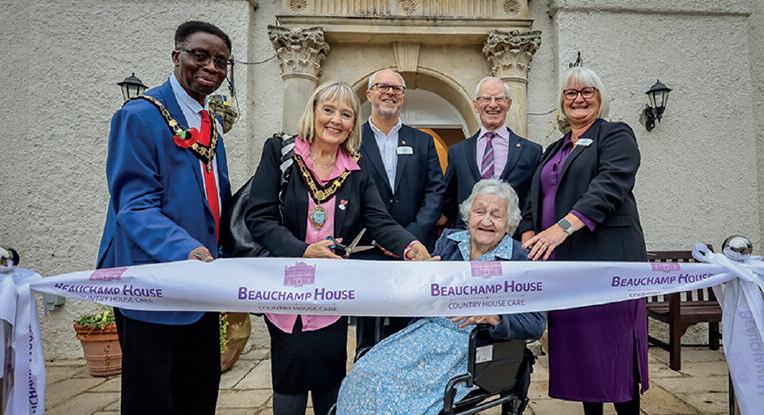

unique addition provides excellent value and a fully robust training package
SCTV are delighted to have won several awards over the last 12 months including: Best Online Health and Social Care Learning Platform – Global Health & Pharma Social Care Awards 2024 ‘CPD Provider of the Year’ – The CPD Awards Social Care Training
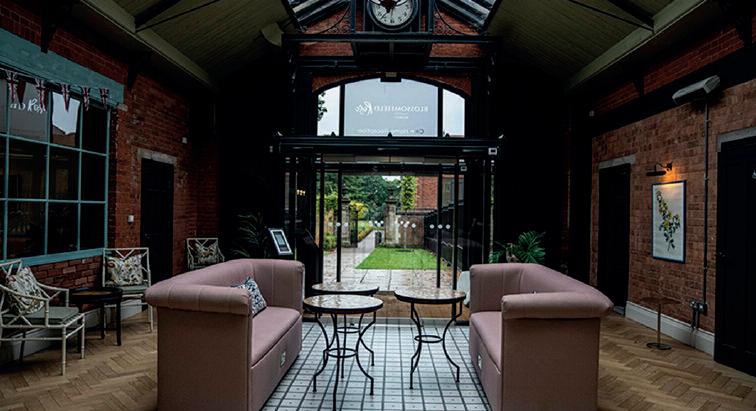














By Niko Phillips,

With 131,000 vacancies at any given day, the UK Care sector grapples with a workforce shortage that will affect its ability to perform vital services to our society With a looming retirement wave due to more than a third of workers over the age of 45 set to retire within the next decade, attracting younger talent has never been more critical
Encouraging Gen-Z to see Care as a viable fulfilling career –rather than a temporary stop-gap – is essential Gen-Z is made up of young professionals born between 1997 and 2012 The challenge in attracting and retaining this demographic is evident in the average turnover rate for those with less than one year of experience in the sector (currently 43 7%)
As Mark Burrows Deputy CEO of Southport Education Group explains "Social care is a vital component of the UK’s health ecosystem and the current and future demand for skilled professionals in this sector is rapidly growing For our Gen-Z learners careers in Care not only offer meaningful, impactful work but also provide sustainable long-term career growth
SHOWCASING
Despite the essential nature of social Care Gen-Z often views the field through a lens clouded by misconceptions: limited pay slow career progression and an association with emotional and physical strain
Additionally awareness of the variety of roles available within Care is often low among young people
To break down these perceptions, recruiters must showcase the social impact and adaptability of Care roles emphasising how these roles align with Gen-Z s preference for flexibility work-life balance and purpose-driven work
To spark interest among younger people to pursue a career in Care the UK government launched its "Made with Care" campaign in 2021 This campaign which runs across social and broadcast media highlights the personal rewards of Care work emphasises flexible job roles and promotes core values like compassion and resilience
To reach Gen-Z, advertising and social media strategies must be targeted and purposeful Campaigns should focus on the idea of a meaningful occupation prioritising content that highlights the diversity of roles which can be shared through the honest testimonials of colleagues from a variety of backgrounds
Furthermore, marketing Care roles as opportunities to incorporate personal interests can be effective For instance incorporating art pet therapy and intergenerational activities with children has become a valuable part of elderly Care practices Care homes have reported that engaging residents in such programmes boost self-esteem physical strength and social interaction Highlighting these meaningful aspects of Care work can play a role in attracting new talent to the industry
Additionally government funding has been allocated to support training and career progression helping to make Care an appealing long-term profession with growth opportunities
CREATING A SUPPORTIVE, GROWTH-ORIENTED ENVIRONMENT
The high turnover rate in Care underscores challenges to retention Retaining Gen-Z domestic workers requires a focus on recruiting the right talent and fostering a workforce culture that supports growth personal fulfilment and career development
Burrows a thought leader in national skills education provides a solution to the challenges of building a domestic skills pipeline for the sector He mentions By engaging emerging talent with hands-on experience and by highlighting the essential role they can play in society, we can hope to build a robust, long-term pipeline of dedicated professionals to meet the evolving needs of the sector
Retaining Gen-Z in Care requires investment in training, career progression opportunities and a supportive work environment Emphasising flexibility in shifts particularly to accommodate studies or personal commitments can help Providing mental health support and pathways for promotion within the organisation also encourages longevity in the role
ADDRESSING IMMEDIATE NEEDS
Although the statistics for workforce vacancies in Care seem dire we do have several immediate tools at our disposal to address these needs According to the 2024 Skills for Care report, 185,000 overseas workers have joined the sector since March 2022
International recruitment can help
resources can be funnelled into recruitment and
over the longer term
Moreover international recruitment brings valuable diversity to the
Staff residents families and supporters of Inglewood Nursing Home have donated £400 to St Wilfrid’s Hospice
The money was collected during the Eastbourne-based home s summer fayre, and were the proceeds of the always popular ‘hook a duck’ ‘tin can alley and skittles stalls as well as the sale of jewellery crafts refreshments and other items
Rani Raju Inglewood’s home manager invited Dave Longman St Wilfrid s Corporate Community Fundraiser to the home recently to receive the cheque Dave also joined residents for a tasty and

The Cedars Care Home said: I have always loved Bonfire Night it s so lovely to celebrate these traditions all together The fireworks were so beautiful The home did us proud ” Rebecca Aldred Senior General Manager at The Cedars Care Home said “We had a fantastic time with our indoor picnic and fireworks display Our residents love keeping this tradition; and reminiscing about years gone by together as we enjoyed our hot chocolates It’s been a brilliant evening Thank you Kevin Slough (Head of Maintenance), and volunteer Stewart Claydon for putting on such a spectacular show
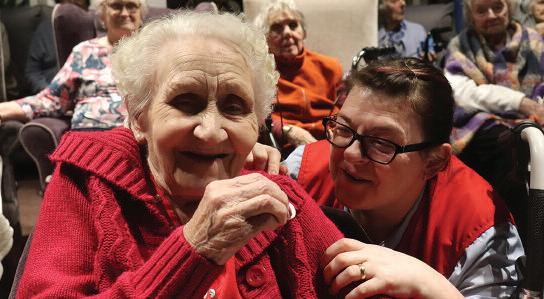


The pobroll® is the invention of Pat O’Brien, a physiotherapist, Moving and Handling trainer and Conflict Management tutor with over two decades of experience in care homes and nursing homes
Care home managers often face challenges in delivering intimate care while balancing efficiency and managing costs, particularly when these essential tasks provoke behaviours that can be challenging to safely manage Traditional methods especially for bed-bound residents often lead to lengthy processes and frequent linen changes driving up costs and consuming valuable staff time The pobroll® provides a transformative solution that supports dignified care achieves significant cost savings and reduces the need for additional staffing
The pobroll® is an innovative bed-bathing wrap specifically designed to enhance comfort and dignity during personal washing for individuals who require in-bed care Centred on the resident’s experience it minimizes distress by providing sensory comfort Crafted with two layers of high-quality cotton-terry toweling and a waterproof layer in between it delivers a soothing calming experience while keeping the bed completely dry Sized for a standard single bed, the pobroll® s dual-layer design offers warmth and a sense of security and privacy allowing residents to maintain comfort and dignity during bed-based bathing routines
BOOSTING COST SAVINGS AND OPERATIONAL EFFICIENCY
The pobroll®'s waterproof design enables caregivers to provide a complete wet wash without the risk of soaking the bed minimising the need for frequent linen changes This leads to fewer laundry loads reducing labour and utility costs as well as wear on linens By reducing logistical tasks caregivers have more time to focus on direct resident care enhancing productivity overall Additionally reduced reliance on disposable wipes results in further cost savings and supports environmentally sustainable practices
With its durable reusable design the pobroll® maintains hygiene standards and allows for extended use across multiple residents As care homes face increased pressure to adopt sustainable practices the pobroll® provides an effective solution that supports both economic and environmental goals

Managing resident agitation particularly for those with dementia often requires specialised training in restraint techniques The pobroll® significantly reduces the need for physical intervention by providing a warm secure covering that alleviates resident distress This gentle approach minimizes aggressive or defensive reactions reducing the number of staff needed for these interactions As a result, facilities can potentially lower staffing levels without compromising care quality yielding substantial cost savings
Additionally reduced dependence on physical intervention decreases training costs associated with restraint techniques By simplifying the process of intimate care the pobroll® reduces the need for specialised training making onboarding smoother and lowering turnoverrelated training expenses
The pobroll® supports compliance with restraint reduction guidelines helping facilities minimise documentation burdens and regulatory liabilities linked to physical interventions This non-invasive solution
improves safety for both residents and caregivers, fostering a culture of dignity and respect that boosts satisfaction among residents and their families
CONCLUSION: A VALUABLE ASSET FOR QUALITY CARE AND COST MANAGEMENT
For care homes, the pobroll® represents a strategic investment, offering measurable savings by reducing reliance on disposable products, lowering laundry and training costs, and enabling efficient staffing Most importantly it prioritises resident dignity and comfort setting a high standard for compassionate, person-centred care For facilities seeking to enhance financial performance and care quality the pobroll® is an invaluable addition to their resources
WHO CREATED THE POBROLL®?
The pobroll® is the invention of Pat O’Brien, a physiotherapist, Moving and Handling trainer and Conflict Management tutor with over two decades of experience in care homes and nursing homes Pat's focus has been on individuals who are frail receiving end-of-life care and often grappling with dementia-related challenges
Throughout her experience of working alongside carers in Nursing and Care homes Pat identified a common issue during personal care routines particularly bed baths where individuals with dementia would frequently experience distress agitation and discomfort leading to compromised hygiene standards and heightened caregiver stress
Recognising the fundamental right to cleanliness and comfort Pat embarked on a mission to devise a solution that could mitigate these challenges and enhance the overall care experience for all concerned The result is the pobroll® hailed as a “game-changer” for those requiring care in bed
Selected as one of their 2023 Accelerator partners, the Alzheimer’s Society recognised the potential of the pobroll® to transform the bed bathing experience for individuals living with dementia and their families Pat is currently being supported by the Alzheimer s Society Innovation team as she moves forward with getting this new innovation to market
A talented care home chef from Devon has cooked his way to victory in not-for-profit Sanctuary Care’s annual

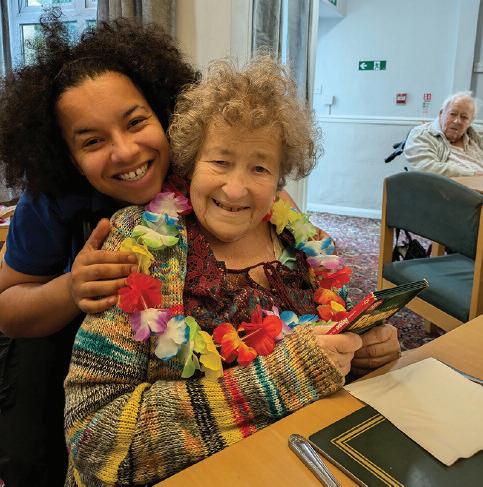

Today (Wednesday 13 November) broadcaster and journalist Angela Rippon CBE will join people affected by dementia at a special Alzheimer s Society parliamentary event in Westminster, calling on the UK Government to make dementia training mandatory for the social care workforce in England Around one million people are living with dementia in the UK making them one of the biggest groups drawing on social care According to Alzheimer s Society nearly 60% of people receiving care at home and 70% of people living in older age residential care have dementia Dementia is progressive and there is no cure It affects memory problem-solving language and communication so care needs to be tailored Most dementia care is provided through social care rather than the NHS yet only 29% of care workers in England have received any dementia training Specialist dementia training equips care workers with the skills and knowledge they need to provide good care build positive relationships and can reduce the inappropriate use of antipsychotic drugs which are sometimes used to manage behaviours that challenge Another benefit is the potential cost savings from reduced GP appointments and emergency hospital admissions
The social care workforce faces a number of challenges such as work-related stress and burnout high turnover rates and limited career progression The charity says a long-term social care workforce strategy which delivers fair pay for care staff reduces staff turnover and provides high-quality dementia care is also needed
Dara de Burca Executive Director of Dementia Support and Partnerships at Alzheimer s Society said: Dementia is a complex condition and affects everyone differently Symptoms vary and get worse over time so people need personalised care which maintains their quality of life for as long as possible Families affected by dementia rely heavily on social care to support their loved ones so it s alarming that less than a third of care workers have received any dementia training We wouldn t expect a midwife to deliver a baby without any training but we expect care staff to provide high-quality care for people with dementia without the appropriate training
We all want the best possible care for the people we love Our research shows investing in dementia training reaps significant benefits and is cost-effective It can reduce agitation in people with dementia, cut emergency hospital admissions and GP visits and the inappropriate use of antipsychotic drugs
Dementia is the biggest health and social care issue of our time costing the UK £42 billion per year but it isn t the priority it should be amongst decision makers We re calling on the UK Government to take urgent steps to improve dementia care by making dementia training mandatory for the adult social care workforce ” Angela Rippon CBE broadcaster and Alzheimer’s Society Ambassador said: “I was a carer for my late mum Edna who lived with vascular dementia After mum s diagnosis I saw the difference the right care and understanding of dementia can make It helped to preserve Mum s dignity, made her feel loved and that she was still a valued part of our family
I ve seen first-hand how dementia changes a person s behaviour When Mum was diagnosed she became agoraphobic angry and aggressive; she had a complete change in character I learnt not to take it personally; it was dementia speaking not my mum But it so clearly showed me the importance of dementia training - how the right attitude towards an understanding of dementia can truly revolutionise and transform care
Oonagh Smyth CEO at Skills for Care said: Dementia is a complex condition that for many people slowly disconnects them from their memories loved ones, and even themselves The data shows that the number of people with dementia is expected to rise by 43% by 2040 from 982 000 today to 1 4 million This represents a significant increase in the demand for care services which will need to deliver the kind of support necessary to truly make a difference for those living with dementia
“Social care can provide the much-needed compassion dignity and understanding these people require to lead fulfilling lives But it s not just about care it s about creating moments of connection in a world that often feels increasingly unfamiliar Achieving this will depend on the proper training of those delivering the support ”
“Mandatory dementia training for every member of the social care workforce is one of the recommendations in the Workforce Strategy we developed and an important step towards addressing a major challenge for our sector
At today s event in Portcullis House, Westminster, Alzheimer’s Society will launch its ‘Because we’re human too report which highlights why dementia training matters and how to deliver it Their research shows that scaling up dementia training for the social care workforce is economical when using person-centred evidencebased programmes like ‘Wellbeing and Health for People Living with Dementia’ (WHELD) and ‘New Interventions for Independence in Dementia’ (NIDUS) Professional
The report also highlights that dementia training promotes better quality relationships between people with dementia and care staff, improves job satisfaction for care staff and reduces staff turnover
To download the dementia training report visit alzheimers org uk/dementiaworkforcetraining
For more information please contact Magda Ulian, General Manager at Melbourn Springs Care Home on 01762 261974 or melbournsprings@barchester com


Last week s release of national charity Access Social Care’s annual State of the Nation report revealed a significant increase in the number of requests for social care advice across nine major advice and helpline organisations The report paints a desperate picture of the current social care system with the rise in demand for advice far outstripping the available resources
The nationwide data in this year's report showed a 222% increase in the number of enquiries about social care needs assessments compared to pre-pandemic as well as a 206% increase in enquiries that required specialist social care legal advice The report compares data across three-time frames pre-pandemic 20192020; the pandemic year 2021-2022; and finally the post-pandemic year 2023-2024 The report is clear: vast numbers of people continue to struggle with accessing social care support Access Social Care is a charity providing free legal advice for people with social care needs Its fourth annual State of the Nation report is a data collaboration project bringing together anonymised data from Royal Mencap Society Age UK Carers UK Independent Age RNIB
because they allow us to see the real issues
founder and CEO of Access Social Care said: The last administration asserted they were adequately funding adult social care whilst civil society estimates there is an annual funding gap of at least £8 4B per year With such a reality gap data collaboration projects like this are vitally important
Two charities that care for Armed Forces veterans and their families living with disability, neurological conditions or dementia, have agreed to work towards a merger Royal Star & Garter operates three care homes in Solihull High Wycombe and Surbiton and Care for Veterans (formerly the Queen Alexandra Hospital Home) operates a single home in Worthing West Sussex
A merger of these two historic charities will bring together all their existing services and expand the Royal Star & Garter group to four care homes Consolidating services will enable the charities to share expertise, resources and support functions to provide a more effective efficient and wider-reaching offer to the veteran community of all ages
The charities have signed a memorandum of understanding that recognises the importance of supporting current residents and staff and enhancing the services delivered to veterans and their families
Chair of Royal Star & Garter Major General Tim Tyler CB commented:“I am delighted to be working with the board of Care for Veterans
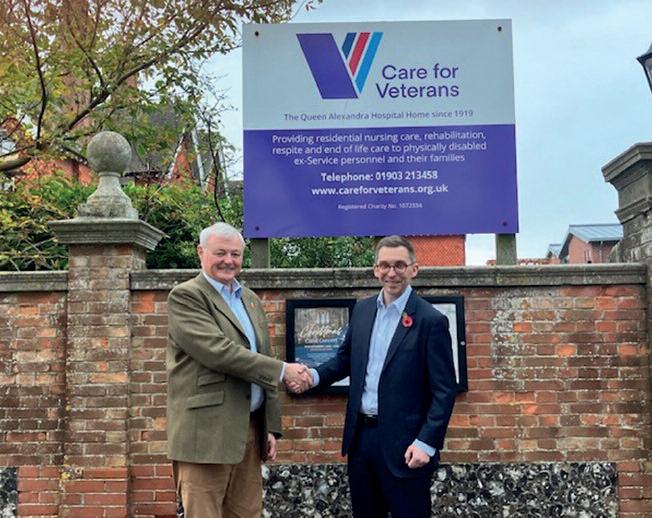
with a view to bringing its home residents and staff into the Royal Star & Garter family Both charities were founded as a result of the Great War have shared similar experiences and ambitions ever since and today share common goals Royal Star & Garter’s long-term strategy is to ensure consistently high-quality care is provided for those living with disability and dementia among the military family This merger is absolutely consistent with this and the two charities will develop and learn from each other for the benefit of our current and future beneficiaries ”
David Williams Chair of Care for Veterans commented: Bringing together Care for Veterans and Royal Star & Garter into a single group unites two charities with a combined history of over 200 years of caring for the veteran community A merger will leverage the expertise of both charities to the benefit of veterans and their families in need of care It
HC-One s Chaseview Care Home in Burntwood, Staffordshire, is celebrating World Kindness Day on November 13 2024 by highlighting and appreciating the good deeds care colleagues do to spread positivity and kindness to others through simple acts of kindness
Residents at HC-One s Chaseview Care Home are celebrating World Kindness Day by discussing what kindness means to them Residents discussed with each other what kindness personally means to them and wrote their statements down on a piece of paper

When asked what kindness means to him resident Anthony Robbins aged 85 who lives at HC-One’s Chaseview Care Home said:

Kindness to me is being given a cup of coffee in the morning with a nice smile from someone who cares ”
Resident Gloria Farnell aged 97 who lives at HC-One’s Chaseview Care Home stated: My father always used to say good manners is having consideration for other people
Resident June Sheasby, aged 82 who lives at HC-One s Chaseview Care Home, commented: “Being kind means doing things for other automatically without expecting something in return



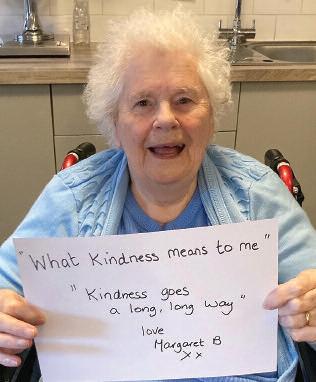



This November marks a major milestone for Exemplar Health Care a UK-based complex care provider as it celebrates its 25th anniversary
Over the past 25 years, Exemplar Health Care has delivered essential care to thousands of people living with complex needs who may have struggled to receive the support they need to live well elsewhere Today the organisation supports more than 1 100 people and employs over 5,500 dedicated colleagues across the country priding itself on creating homes and communities where people feel safe and respected
To commemorate its remarkable 25th anniversary all 52 Exemplar Health Care homes have been hosting celebratory parties Homes marking their own milestones this year – whether it’s their 5th 10th or even 20th anniversary – have also had special celebrations
As part of the festivities colleagues and residents alike have reflected on their favourite moments as part of the Exemplar Health Care community sharing stories that highlight the positive impact of living and working in an environment built on care and connection
Henry Mauricio Senior Health Care Assistant at Longley Park View care home shared:
“I started working at Longley Park View care home in 2004 I m from the Philippines, where we’ve got no snow whatsoever so on my first Christmas here all my colleagues encouraged me to go outside and play in the snow with everybody For me it’s not about the money it’s about the camaraderie These people are like
a family to me ”
Rob a service user at Dearnevale care home said: I just want to say a big thank you to all the staff If I hadn t come here I don’t think I d be around But this place has made me what I am
Homes have also hosted a fun organisation-wide bakeoff competition led by its Service User Council Teams within every home are collaborating on a delicious, decorated cake which will be judged by Home Managers on their “wow” factor Winners from each home will move on to the final with the chance to win exciting gift card prizes
Additionally, a virtual pub quiz brought together people from all homes across the country testing their knowledge of Exemplar Health Care’s fascinating 25-year history
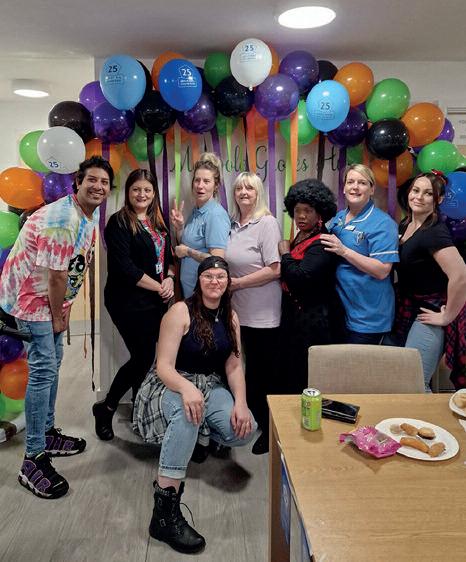
To commemorate its milestone birthday Exemplar Health Care has created a montage video featuring reflections from both colleagues and those they support The video highlights the deep and lasting impact the organisation has had on people s lives offering care that is both essential and life-changing Steve Melton, Chief Executive of Exemplar Health Care, said: “Our 25th anniversary is a moment to reflect on the incredible journey we ve been on It s not just about the years we ve been in operation but the
lives we’ve touched, the

At Redcot the Haslemere-based residential care home run by charity Friends of the Elderly, the residents and care team have been celebrating with Ann Essam one of the care home’s Activities Coordinators, who has just won the coveted Unsung Hero –Making Care Possible’ Award at year’s Surrey Care Awards
Ann who joined Friends of the Elderly in 2001 after she returned to work following her retirement was presented with the award on Friday 8th November at the Surrey Care Awards which was held at Denbies Wine Estate in Dorking When I heard my name being announced as the Winner I was completely blown away ” said Ann “I couldn’t believe it To be acknowledge by the Surrey Care Awards in front of my peers for doing the job that I adore doing was amazing – it still hasn t quite sunk in The residents are my friends - my family - so it’s not like working at all; I spend each day laughing and having fun with my friends Ann returned to work after she’d retired as, in her own words, she couldn’t take to it and was adamant she wanted to continue to care for and help others Being able to work each day with the fantastic Redcot residents is a blessing ” continued Ann “As I’m not that much younger than most of the residents
we can relate and connect so well on so many levels about so many things I truly believe this is why we are all so close and one big happy family ”
Ann is full of energy and makes sure that the residents are kept both physically and mentally active every day Ann has designed and delivers a fantastic activities programme ” added Jan Daly Redcot’s Registered Manager and one of the Charity s Regional Managers From the minute Ann arrives in the morning until the second she leaves in the evening the residents’ wellbeing is at the heart of everything she does
“To have Ann s hard work, caring demeanor, her amazing achievements and outstanding skills recognised by The Surrey Care Awards is a great validation of everything Ann does every day added Jan
“Ann goes the extra mile to positively contribute to the quality of life health wellbeing and happiness of each resident including those who are living with dementia it s in her DNA Redcot and Friends of the Elderly are very lucky and fortunate to have her

“To say that I feel honoured is an understatement Everyone who was nominated at the Surrey Care Awards not just in my award category but in each category were all so worthy All of us are winners in my eyes ” concluded Ann

Social care in Wales could collapse as a result of a £150 million triple whammy in the “ruinous” Budget experts warn
Care Forum Wales (CFW) says the controversial measures announced by Chancellor Rachel Reeves pose a “greater threat than Covid” to the sector and fears care homes and domiciliary care companies will inevitably be forced to close
The only way to avert the impending crisis according to CFW chair Mario Kreft MBE was for the social care sector to be granted an NHS-style exemption from the increases to employers’ National Insurance contributions as well as support to meet the other additional costs
With a 1 2% rise in Employer National Insurance contributions and a cut to the Secondary Threshold to £5 000 alongside the five per cent increase in the Real Living Wage to £12 60, CFW has calculated the sector in Wales faces a £150 million funding hole to plug In North Wales that amounts to a gap of £40 million
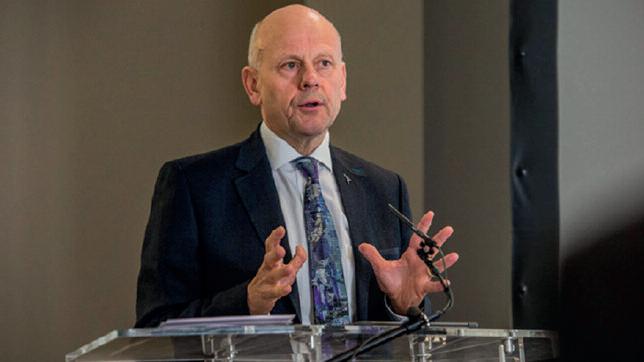
CFW revealed that 40 care homes in Wales had already been forced to close since the onset of the Covid pandemic at least four of them in North Wales with a combined loss of 163 beds
Even before the Budget specialist business property adviser Christie & Co Wales faced a 10 000 deficit in the number of care home beds Wales needs over the next decade It comes at a time when demand is spiralling upwards, with the over 85 population set to double over the next 20 years
The sector in Wales, said Mr Kreft, was made up mainly of smaller, community based care homes and nursing homes and were typically family-run businesses
He said: “Without an exemption from these additional and potentially ruinous costs -whether that comes from the UK Government or extra funding from the Welsh Government – many care homes and nursing homes and home care companies face a real existential threat
“These measures will see average size care homes facing extra costs of tens of thousands of pounds, with larger care providers facing even heftier bills amounting to hundreds of thousands
“The social care sector already has large wage costs compared to other industries because of the number of workers it needed
“To put it into context a typical residential home where people don’t need nursing has a wage bill as a proportion to turnover of about 60 per cent That rises in nursing homes to 65 per and more
For domiciliary care the percentage of wages to turnover is over 80 per cent
“So when you look at the context of those figures and add it to what we have seen in the Budget it’s a triple whammy
“In Wales we won the argument that was insufficient and the Welsh Government through their guidance
to get a five per cent increase in their pay packet while others will eligible for 6 7 per cent increase in the National Living Wages
But the point is that is a massive and significant cost on the wage bill
“And when you add the National Insurance rise this all amounts to a massive extra cost on the
of staff from social care to the NHS
One way or another we need to have prompt reassurances that the sector will be reimbursed for
extra costs
“The social care sector is essentially a support service for the NHS and should be given the same exemption from having to pay the extra NI employers contribution while the increased costs of the Real Living Wage should be funded by the extra £1 7 billion coming to Wales from the chancellor’s Budget
Basically if you don t fix social care you will never fix the NHS it s as simple as that
“Social care is a very cheap way of enabling the NHS which is a very expensive thing to run
These care homes are businesses but they are also vital community assets which are fantastic value for money which enable people to remain in their own community
“The Welsh Government’s forward thinking policy of Let’s Agree to Agree dictates that the actual costs of providing social care should be met to the sector is financially viable
“We came out of Covid with 40 fewer care homes and we will potentially lose even more as a result of this ruinous Budget unless the sector gets the supports in deserves and needs
Mr Kreft’s fears over the impact the Budget will have on the social care sector without more funding were echoed by Anglesey care home director Kim Ombler
She owns Glan Rhos Care Home at Brynsiencyn with her sister Helen and brother David
The home has 52 beds and the family have been running the business for 35 years
They have calculated that the Budget is going to cost Glan Rhos an extra £127 000 a year
Kim Ombler believes the sector could collapse without additional support to ensure its survival
She said: We are incredibly worried about changes in the Budget on the crucial services we provide
“We care for 52 residents and want to be able to continue to recruit staff and continue providing the best
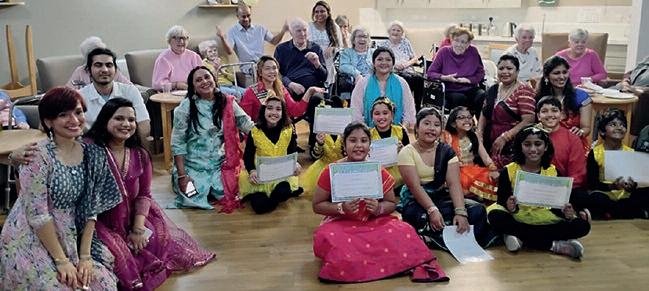

Tens of thousands of people who have a stroke could be diagnosed and treated sooner as new data found that the average time between onset of first symptoms and a 999 call being made was nearly an hour and a half
New analysis of NHS data shows that for 2023-24, of 41,327 patients with a recorded time of symptom onset the average time between first symptom and a 999 call being made was 88 minutes
The figures come as the NHS launches the first major update to the Act FAST campaign since 2009 urging the public to call 999 immediately if anyone experiences one of the three common symptoms including struggling to smile (Face) or raise an arm (Arms), or slurring their words (Speech)
England s top doctor today urged the public to call 999 even if the first sign of stroke doesn’t seem like an emergency and said immediate action at the first sign of a stroke could help save and protect many more lives”
The analysis has been published by the Sentinel Stroke National Audit Programme at King s College London and comes as new polling of 2 001 adults in England found that 57% of respondents believed you should have 2-3 symptoms of a stroke before calling 999 despite just one being a sign of a medical emergency
Nearly two thirds of respondents (64%) said they would not call 999 as their first course of action if they noticed someone was suddenly struggling to smile
The NHS campaign launches with a brand new TV advert showing example symptoms – a man recognising his partner is struggling to smile while watching TV (Face) a decorator suddenly unable to lift their paint roller (Arm), and a grandmother struggling to read their grandchild a bedtime story (Speech) – which will run across TV TV on demand and radio in England until mid-December
As part of the campaign launch, a powerful new film has also been released which features stroke survivors listening back to audio recordings of the real 999 calls that saved their lives
Professor Sir Stephen Powis said: “These figures highlight very clearly that we must do more to support people to recognise the symptoms of stroke in themselves and others and take action to call 999 at the earliest opportunity Stroke symptoms can be less obvious or dramatic than you might expect but even if it doesn t seem like it any sign of stroke is always an emergency and it’s vital you call 999 immediately
“This campaign is so important – greater awareness of the need to act fast and dial 999 could help save and protect many more lives as we know that earlier recognition of symptoms and immediate action to

call 999 can enable faster access to specialist treatment and the best chance of reducing long-term effects of a stroke ”
Around 100 000 people have a stroke each year in the UK which occurs when the blood supply to part of the brain is cut off Without prompt treatment a stroke can result in death or long-term disabilities such as paralysis memory loss and communication problems
While more people are now surviving a stroke than ever before thanks to advances in NHS care strokes remain the fourth single leading cause of death in the UK, with 38,000 stroke-related deaths each year
A stroke can happen to anyone at any age but those at increased risk include people aged over 50 years old people from a Black or South Asian background or those living with existing conditions such as high blood pressure, diabetes or sickle cell disease
Dr David Hargroves NHS national clinical director for stroke and consultant stroke physician, said: “When someone has a stroke, it s estimated they may lose around two million brain cells a minute which is why rapid diagnosis and treatment is critical – the first sign of a stroke might not seem like much but face or arm or speech at the first sign it s time to call 999
“Thanks to greater awareness of the symptoms and advances in NHS care more people are now surviving a stroke than ever before but there is much more to do help save lives and reduce the long-term impact of strokes Acting FAST remains vital – whether it is a friend loved one or even a passer-by dialling 999 quickly saves lives ”
Juliet Bouverie OBE CEO of the Stroke Association said: “Over 88 000 people survive a stroke every year in the UK but surviving astroke is just the start of a long and traumatic battle to finding their way back to life Mums dads grandparents young people even chil-
dren can be stroke survivors and the impact of stroke on them and their loved ones can be catastrophic
This new NHS campaign is so important to help raise awareness that stroke is always a medical emergency If you spot any of the three common signs of a stroke in someone, the first thing you should do is call 999 The quicker many stroke treatments are given, the better As we say, “time is brain”, so it’s important to recognise any of the signs of a stroke and act immediately Acting FAST is vital for stroke survival and to help improve the journey to recovery
In the last few years NHS teams have rolled out innovative new ways to find and treat more people with the major risk factors for cardiovascular health issues including rolling out blood pressure checks in high-street pharmacies for people over 40 making free blood pressure monitors available to 220,000 people at increased risk, and rapidly rolling out blood-thinning drugs to help save thousands of lives
Andrew Gwynne Minister for Public Health said: “It is important to treat a stroke quickly and raising awareness of symptoms is vital to saving lives It is not just about recognising when a stroke is happening – we know that many of the causes of strokes are preventable and this government is taking action to tackle the biggest killers such as heart disease and stroke
“The NHS Health Check Programme aims to prevent cardiovascular disease, including stroke, in people aged 40-74 years through assessing risk factors such as blood pressure and referring people to behavioural support and clinical treatment to reduce their risk Each year the programme engages over 1 3 million people and prevents around 500 heart attacks and strokes a year
We are currently developing a new digital NHS health check enabling people to complete this life saving check in their own home
Jessica Cunningham Executive Director of Operations at South Western Ambulance Service NHS Foundation Trust said: “We are proud to support the NHS England stroke campaign to raise awareness of stroke symptoms and the importance of acting fast
“Every second counts in a stroke emergency and our call takers and clinicians within our emergency operations centres are highly trained to recognise the signs and provide life-saving guidance to those calling 999
This campaign shines a spotlight on their essential role and the critical first step of dialling 999 We hope this initiative encourages the public to recognise stroke symptoms quickly and not hesitate to call for help”

A Nottinghamshire home welcomed a special fourlegged visitor to come and see the residents MHA The Heron opened its doors for Cupcake, a pony from Pet a Pony who provide schools nurseries and care homes the opportunity for their animals to come and visit them
Cupcake a miniature Shetland pony went on a tour of the home and even visited the bedrooms of some of the residents
She was accompanied by her handler and everyone at the home was really impressed with how well behaved she was The home provides residential care for 39 residents Claire Belshaw administration manager said “Pet a Pony provides therapy pony services and after having
a look around we were very happy to know they are local to us
“The visit was great, the residents loved it, their reactions were priceless when she visited them in the rooms and some couldn't believe it
“Cupcake was brilliant she was really well behaved and was a real joy throughout the visit
“We even had some family members who came in and they enjoyed it just as much
“For most of our residents it was a trip down memory lane as they would have spent a lot of time on farms growing up
Animal visits are usually very popular with our residents so we are definitely looking to do something like this again ”


A shocking new report by end of life charity Marie Curie has set out the stark financial reality of
in the United Kingdom today
The report, Dying in Poverty 2024, based on research by Loughborough University, reveals that more than 300 people are now dying in poverty every single day in the UK
Previous research from Marie Curie found that 93 000 people died in poverty across the UK in 2019 That number has now risen to 111 000 a 19% increase in four years
Dr Sam Royston Executive Director of Policy and Research at Marie Curie said: No one should have to face their final days worrying about money or whether they can afford to heat their home
And no matter what way you cut it by age gender ethnicity or location rates of poverty are higher for people at the end of life than the rest of the population
At a time when our politicians are debating whether or not to legalise assisted dying surely they will also want to ensure no one would feel any pressure to choose an assisted death simply because they cannot afford the bare essentials of a decent standard of living ”
The report also reveals a deeply concerning analysis of how many people are dying in fuel poverty – at least 128 000 in 2022 That’s more than 1 in 5 of all people who died that year and includes 110 000 pensioners
Simona’s husband, David, died in June 2024 from a stage four glioblastoma, six months after he was diagnosed She said: David had to stop working straight away after his diagnosis because he couldn t walk or move And I had to stop work to be his full time carer The amount of money we had through state benefits was barely enough to get us to the end of the month
“His condition meant that he was constantly cold so we had to keep the heating on all the time We discussed this with our energy companies and the only things they provided was an electric blanket and a discount of £200 – it wasn t enough
“All the medical equipment David needed was electric It really raised the cost of our energy bills, and I still have an outstanding bill of £5 000 from the energy company
“When David was on oxygen towards the end of his life, I spoke to the provider as the oxygen machine needed to be on all the time
They told me they would refund the cost of running the equipment and later I had a cheque through the post from them for £13 ”
Marie Curie is calling on the UK Government to guarantee working age people with less than 12 months to live a pension-level income and introduce a social tariff to cut energy bills for people at the end of life
Once again much like the charity s previous research the Dying in Poverty 2024 report shows that people who die before reaching retirement age are at a much higher risk of dying in poverty than pensioners (28% vs 16%)
This is partly because dying people of working age often experience a “double impact” of lost income and rising costs particularly energy bills And partly because the State Pension remains significantly more generous than working-age benefits
The State Pension has increased in real terms in recent years thanks to the ‘triple lock In contrast, working-age benefits have been subject to a range of real-term cuts and freezes that have reduced their value considerably
Giving terminally ill people of working age benefits which are level with the State Pension would provide crucial financial security and address the injustice of people dying before they can access the State Pension despite potentially paying into the system for decades
If the planned rises to State Pension Age go ahead over 15 000 more people a year will die before accessing the State Pension
Dr Juliet Stone Research Fellow from the Centre for Research in Social Policy at Loughborough University, says: “The sharp rise in poverty at the end of life reflects the increasingly difficult financial circumstances faced by low-income households over the past four years It is clear that poverty at the end of life cannot be fully tackled without efforts to address poverty more generally but people in the last year of life face additional obstacles to achieving an adequate standard of living
Changes to the social security system especially addressing the inadequacy of state benefits for people working age with a terminal illness could go some way to reducing the risk of poverty at the end of life But there is also a need to address the additional costs that people face when diagnosed with a terminal illness We know that disability benefits regularly fall far short of covering these additional costs But broader policy reform including improvements to the availability of affordable services including those related to social care, could help to bridge this gap, and allow for a dignified death without the additional burden of financial hardship
Calculations within the report also show that a social tariff that halves energy bills could lift as many as 54 000 (45%) dying people out of fuel poverty
Dr Elaine Robinson Research Associate from the Centre for Research in Social Policy at Loughborough University, says: “Nobody should have to choose between financial hardship or exacerbating their condition by living in an inadequately heated home or by not using vital medical equipment especially those at the end of life
Existing fuel poverty policy does nothing to help those who are terminally ill – they can t wait for energy efficiency improvements to housing or change their behaviour to save energy Working adults in particular need support to help with the loss of income they often experience at the onset of terminal illness Social tariffs would offer some much-needed help but these don t do anything to tackle inadequate incomes –current state benefits for terminally ill working-age people fall well short of meeting the additional costs many face
Since December 2022, Marie Curie has supported almost 4000 people with energy-related enquiries via its free Support Line A partnership with the UK Gas Distribution Networks funds specialist Energy Support Line Officers
To sign Marie Curie s petition calling on the UK Government to fix the cost of dying crisis visit mariecurie org uk/cost-of-dying-petition
It’s time for an upgrade!
At Diversey Washcraft, we know how frustrating it is when laundry equipment fails, especially when you’re in the middle of a busy season. Is your dryer breaking down, costing too much to run, or leaving you with laundry and get your laundry operations back on track.
Why Choose Diversey Washcraft?
Save on Energy Costs:
money while maintaining top performance. Imagine reducing your utility bills while processing more laundryit’s a win-win!
No More Breakdown Worries: Say goodbye to constant repairs! With our reliable equipment, you’ll experience fewer breakdowns and disruptions. This means more uptime, fewer headaches, and smoother daily operations for your team.
Maximize Space:
w
space. Perfect for businesses with limited room but high demands, you can double your drying capacity without needing extra square footage.
foot e a squar xtr ding e ene & Hospital ear or C it f for t F erfec fec P const olume and h-vhig orms ar unif ls,owe n, t line








Perfect Fit for Care & Hospitality: We understand that laundry needs in the care and hospitality sectors are high-volume and constant. That’s why our solutions are tailored to handle even the heaviest loads, ensuring your linen, towels, and uniforms are always fresh and ready, no matter the season.
ommer est in C e B Th
The Best in Commercial Laundry Solutions
in your business. Our range of high-performance commercial laundry equipment is trusted by care homes, hotels, and
ange ss. Our r usine our b y eagoot ity: & that laund andunderst
When you choose Diversey Washcraft, you’re not just getting
We’re with





Residents

One-hundred-year-old World War Two veteran Boyd Salmon was invited by the Royal British Legion to cut the ribbon on the poppy display at Lymington War Memorial
A resident at Court Lodge in Lymington for the past four years the former Royal Navy officer was the honorary guest at the occasion and rose from his wheelchair confidently to perform the task Boyd who was badly injured clearing enemy mines from a beach in The Netherlands in 1945 is well known in the Lymington community
He has a certificate of appreciation and a lifetime membership of the Royal Naval Association and was invited to join Lymington’s official D-Day 80th anniversary parade in June 2024 Court Lodge Home Manager Rebecca Hannam who accompanied Boyd to the Remembrance memorial, said: “He wore his medals with pride as he cut the ribbon
Similarly ex-service personnel living at Brook View in West Moors took part in a community Remembrance parade in the Dorset town

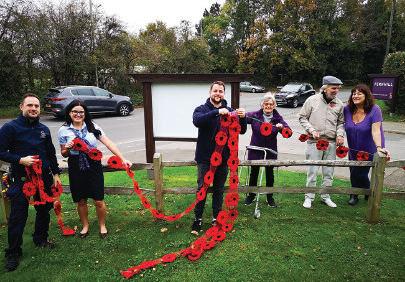

Veteran JoJo Cook laid a wreath for her RAF Squadron and David Vincent who served in the Royal Navy carried a wreath on behalf of all at Brook view
The home was one of many across Colten Care to display poppy installations carefully made by residents One lady Gwen Carter knitted all year and contributed a sizeable
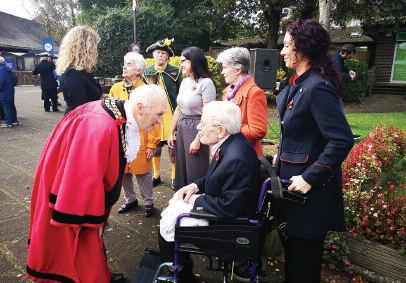


number to the home s total of 300 poppies
Companionship Team member Rebecca Grimsey said: “We staged the poppies at the entrance of Brook View for all to see and finished it off with a poppy-covered soldier with his head in his hands ”
Residents from Fernhill a dedicated dementia care home joined Remembrance events in Ferndown
Among those on parade duty for the launch of the poppy appeal
were three residents with service histories: Elisabeth Wilson, June Welford and Ron Howes
The event, held at the Dorset town’s Barrington Centre and organised by Ferndown Town Council and the Royal British Legion, gave them the opportunity to speak with air cadets and Scouts the Mayor of Ferndown Terry Cordery and the Deputy Lieutenant Liz Williamson Ron who served in the RAF was presented with a poppy by a young air cadet Jackson Heath
Ron told carers afterwards: “That
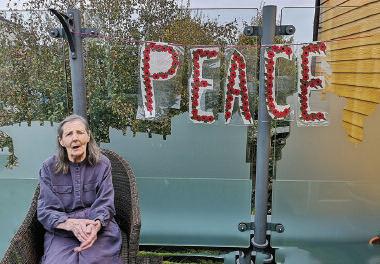

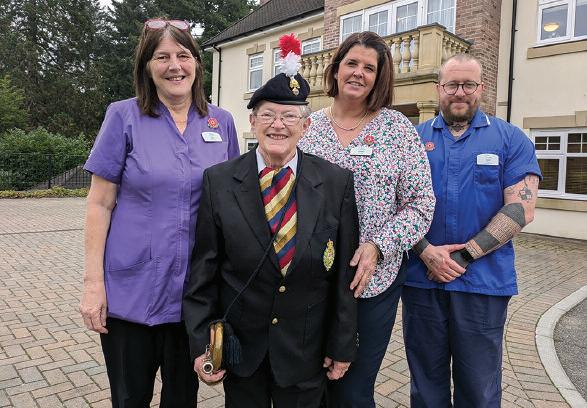

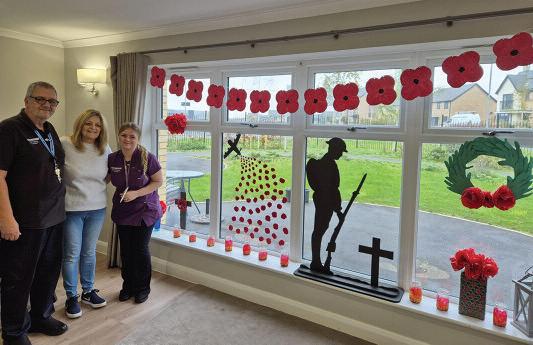

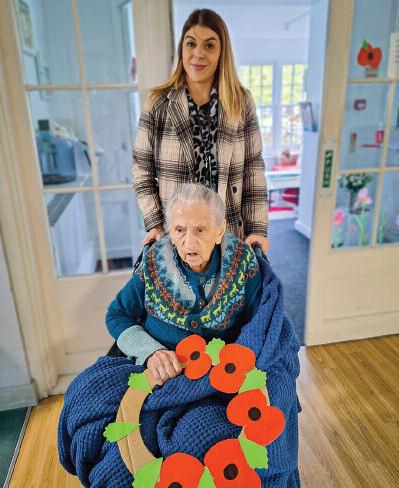
At Orford House the Coulsdon-based residential care home run by charity Friends of the Elderly the residents members of the local community and care team have held an Armistice Day service and two minutes silence to remember all fallen Commonwealth soldiers of the First World War
Held beside the care home s newly positioned Tommy Soldier Memorial, the service was conducted by Michelle Kennett, the care home s Registered Manager Talking about the Tommy Soldier Memorial Michelle said: “I wanted to do something that not only commemorated the lives that were lost during the First World War but also to show our thanks and support to the many veterans who served our country So rather than buying a statue from a company I searched the internet and found the iconic statue memorial figures made by British Legion veterans ”
Whilst researching the memorial statue Michelle discovered many fascinating facts relating to why the instantly recognisable figure is known as Tommy Whilst I was speaking with the British Legion veterans who created our statue we talked about the Great War in detail I was told that the term “Tommies” is closely associated with British soldiers who served during the First World War as Tommy is slang for a soldier who served in the British Army
In fact legend says that in the World War I trenches enemy troops would shout out ‘Tommy’ across the infamous No Man’s Land when they were looking to speak with a British soldier ” continued Michelle Residents laid wreaths at the Orford House Tommy Soldier Memorial and at the eleventh hour, on the eleventh day, of the eleventh month residents care team and members from the care home s local community gathered at the Tommy Soldier Memorial and held a two-minute silence and honoured all those who gave so much
Along with their own thoughts they remembered The Armistice, the agreement to end the fighting of the First World War as a prelude to peace negotiations which began at 11 a m on 11th November 1918

“Our Tommy Soldier Memorial is located on the lawn on the roundabout in front of Orford House s main doors It is an ideal spot for ‘Tommy as the residents can see him when they look out of the windows of the dining room and lounge added Michelle It was an emotional and poignant service, which everyone who attended found very touching By sourcing and purchasing our Tommy Soldier from the British Legion veterans I felt we were doing our bit to support all those that had defended our country and now make a living by creating statues figures and sculptures to
On Sunday 10th November Braywood Gardens care home in Nottingham part of the Runwood Homes group, paid heartfelt tribute this Remembrance Day, hosting a commemoration within the home












Ringwood
A fantastic evening and was enjoyed by everyone in the audience General Manager Gemma Chalkley said Our residents had a wonderful evening listening to the beautiful music and also being able to pay their respects We do our best to provide a wide range of activities and entertainment at Moors Manor as part of the lifestyle enrichment programme for residents and this was one of our favourites!”
One resident said I haven t heard the Glen Miller songs in many years The classics never go out of style!

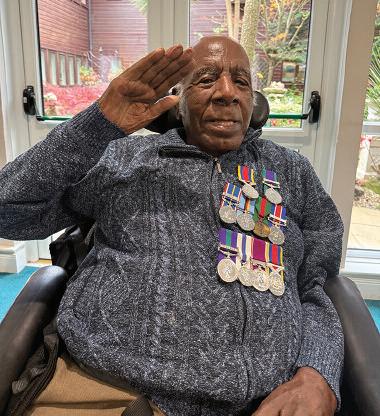
Residents at Austen House in Lower Earley, Reading commemorated Remembrance Day on Sunday 10
November They joined the rest of the United Kingdom in holding a two-minute silence at 11am
As well as marking Remembrance Day by wearing poppies and watching the televised service from The Cenotaph residents took part in therapeutic activities such as colouring Poppies and created beautiful display
Michael a resident at Austen House said It is very important that we keep the memories of those who fought alive and that we also think about those involved in conflicts around the world today
Emmanuel one of our residents who served for 22

years in British Army felt proud to wear the numerous medals which were awarded to him during the services He was sharing the experience to be first officer of colour in Blues and Royals and set the path for others too Emmanuel fought in United Nation, Germany, Singapore Cyprus Malaya and Kenya also he saved many lives and helped to re-build the Communities Arturas Repkovas, General Manager at Austen House said: “We have many residents with personal ties to the military and many who have experienced conflict either at home or abroad so it was important to us to mark Remembrance Day and honour the contribution of everyone involved in the World Wars and in subsequent conflicts



A resident at HC-One’s Gittisham Hill House Care Home in Honiton, Devon, shared his endeavours of serving in the military ahead of this year s Remembrance Day
Hugh Grout 93 better known as Keith who served in the Royal Navy back in the late 40s Keith subsequently received an MBE award from King Charles for his services
Serving on HMS Corunna for over two years Keith s illustrious career saw him travel the world and rising the ranks
Keith Grout HC-One s Gittisham Hill House Care Home resident said:
“I was on HMS Corunna for over two years I started working as an ordinary seaman before I left as a Leading Seaman with six months seniority
“I subsequently joined the destroyer warship, where I was taken off general duties and became a member of the gunner s party I was responsible for the B turret where I maintained the outside and ensured the inside was clean and ready for inspections ” In 1971 Keith received an invitation to attend a garden party at Buckingham Palace This led the late Queen Elizabeth II to announce that the British Legion would soon be known as the Royal British Legion In 2002, Keith was sent a letter from the Prime Minister s Office informing him that he had been awarded an MBE for his services to the Royal British Legion in Devon

Keith attended Buckingham Palace for a second time to receive his MBE award accompanied by his wife Lilian and his two children Janice and Andrew Keith has lived at HC-One s Gittisham Hill House Care Home for two years

When speaking about his encounter with King Charles, Keith added: King Charles surprised me by talking about the Royal Navy We spoke about various events and shook hands before I stepped back, bowed and walked out before proceeding to pose for photographs afterwards and then traveling in style to the Savoy Hotel ” Across HC-One’s
ing as a striking reminder of the sacrifices made by so many
More than 100 people contributed to knitting the poppies over a 12month period creating a display that stretches over ten metres

Day and has since become a symbol of remembrance and unity Armistice Day observed on 11th November each year marks the end of World War I and honours those who gave their lives in military service Residents and staff at the 60-bed care home in Nuneaton along with their families and friends worked together to create the poppies pouring their time effort and care into every stitch
The installation includes red poppies, symbolising remembrance for those who served in the military particularly in the First World War It also features white poppies for peace and purple poppies to honour the animals that lost their lives in war
The red poppy became a symbol of remembrance after the poem In Flanders Fields described how poppies grew among the graves of soldiers in the fields of Flanders
Each knitted poppy now decorates the front of the care home, serv-
The soldiers beside the poppies were crafted by Shaun, the care home s Receptionist while Admin Manager Teresa oversaw the project and placement
This project has been so much more than just a display Teresa shared "It’s been a way for all of us to come together and show our gratitude for those who gave everything for our freedom It s a true labour of love
Linda a 78-year-old resident shared her thoughts by saying “Least we forget the sacrifice made by so many for us to live as free people God bless them, everyone ”
90-year-old Jean P who grew up in Birmingham] and witnessed the effects of war on her community commented “This display is truly special It s a lovely tribute to all those who lost their lives for us It brings back so many memories ”
This moving display will stand as a lasting tribute to the heroes of the past and the unity of the community
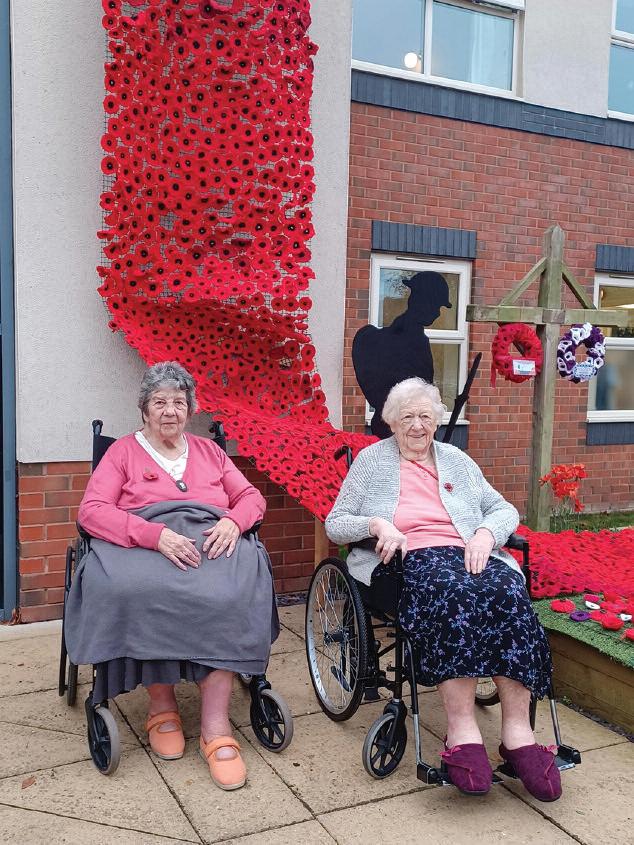
At Alex Wood House care home in Cambridge one resident looks forward to Remembrance Day with a special sense of pride and respect Basil Taylor once a member of the esteemed Household Cavalry treasures the annual day of reflection and remembrance, honouring both his service and the sacrifices made by others in the armed forces
Basil’s journey into the military began in 1959 when he joined the Household Cavalry as a Horseguard He was only a teenager at the time and eager to serve so eager that he added a few months to his age to sign up before he was officially called for national service
The initial training an intense eight weeks of marching drills or square bashing," as it’s known was tough Despite moments of doubt when he almost packed up and went home he persevered driven by the dream of becoming a Horseguard
After the demanding march training Basil s journey truly began when he was introduced to the horses His primary responsibilities included caring for three magnificent horses Bobby Sades and Igloo He became skilled not only in riding but also in grooming and preparing them for parades It wasn t just the horses that needed attention; Basil also spent hours polishing his Horseguard’s ceremonial helmet boots and breastplate to keep them parade-ready Basil remembers fondly the 16 weeks of riding lessons, held in Windsor Great Park near Windsor Castle It was a challenging but fulfilling time learning to ride with grace and control while armed with a bayonet or a sword and bonding with his fellow Horseguards
Once his training was complete Basil moved to the Knightsbridge barracks close to the famous Horseguards Parade in London He spent the next three years as part of this prestigious unit performing in parades and serving as a per-

sonal guard for Queen Elizabeth II during events such as Trooping the Colour He recalls the pride he felt riding through London with a police escort guiding them along the grand streets of Knightsbridge Hyde Park Corner and the Mall
After three fulfilling years Basil left the army but his commitment to service continued He became an active member of the Royal British Legion, proudly carrying the Legion standard in Fulbourn s Remembrance Day parades Though Basil never saw active combat he holds a deep respect for those who


A former Wren from Bournemouth has reflected on her memories of meeting her future husband on Remembrance Day Rae, who lives at Talbot View care home, on Ensbury Avenue, joined the Wrens (Women s Royal Naval Service) aged 19 She went for six weeks of training at HMS Dauntless near Reading then HMC Ceres in Yorkshire and was later sent to work at HMS Raleigh in Cornwall where she was given the role of a writer helping with clerical and



the Lifestyle Manager at Coopers Croft said It was a pleasure to be able to grant Brian s wish to see a Wellington Bomber in honour of Sergeant White
‘Learning about our residents’ histories is so important to us as a care home because their passions and experiences have made them the incredible people they are today and allows us to help create memorable moments such as this


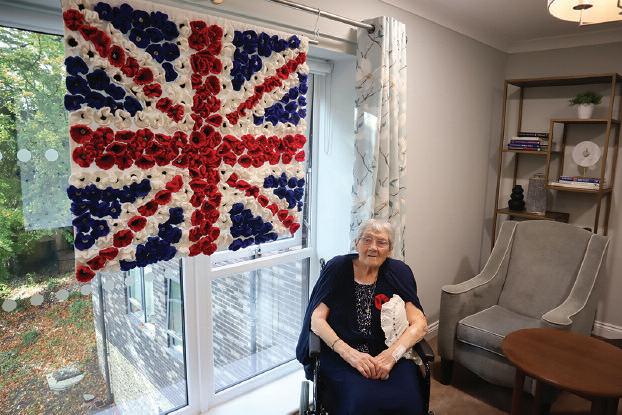

Remembrance Day ceremony at Broughton House Veteran Care Village in Salford A 100-year-old D-Day paratrooper was among the residents who led the poignant service in the grounds of the care home
Peter Belcher a sergeant in the Parachute Regiment during the Second World War read the Lord s Prayer and the Kohima Epitaph during the moving ceremony
Other service veterans taking part were Major Andrew Dinning who served as a commando with the Royal Marines, Captain Robert McMillan, who served with the Royal Electrical and Mechanical Engineers, and Lt Sandy MacDonald who served in the Royal Artillery Major Dinning read the poem In Flanders Fields, Capt McMillan laid the wreath and Lt MacDonald read the Exhortation
Residents wore their Broughton House blazers and medals for the service which was also attended by military personnel

The ceremony also featured the lighting of Lamp Lights of Peace from

of the lamp lights and members of its team were among those taking part in the Broughton House ceremony
Challenge The Wild founder Dan Searson who was a captain in the Royal Army Medical Corps said “The lighting of the Lamp Lights of Peace symbolised our enduring commitment to honour these heroes The flames illuminate their bravery
The ceremony also featured a bugler playing Reveille and The Last Post as well as a two-minute silence
Afterwards children from St Philip s Primary School in Salford sang hymns for the guests in the Veterans’ Mess at Broughton House
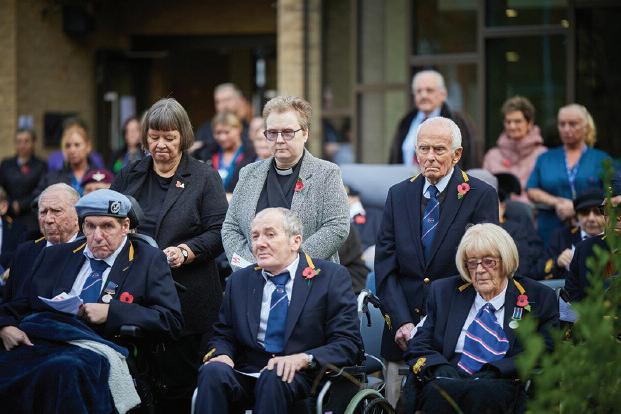
Karen Miller, chief executive of Broughton House said: The service marks an important occasion for our residents to remember their fallen colleagues and the sacrifices made by all service personnel It’s really important for future generations to appreciate what they went through in order to defend our country and our freedoms
Peter Belcher said: “It’s important to remember the men and women who fell in wars Those fighting in World War One had it much worse than we did battling in the trenches ”
Broughton House has cared for more than 8 000 veterans since it opened its doors to the ex-service community in 1916 It was recently redeveloped into a complex with a 64-bed care home, including two 16-bed households dedicated to veterans with dementia as well as independent living apartments an array of modern facilities, a museum, gym, hairdressing and barber’s salon, and a restaurant and bar for residents It also has an Armed Forces Support Hub which provides support for elderly and working age veterans living in the community
Residents of Broughton House were VIP guests at the Remembrance Sunday service at Salford Cenotaph Gary Taylor a resident of the Broughton House apartments read the Exhortation

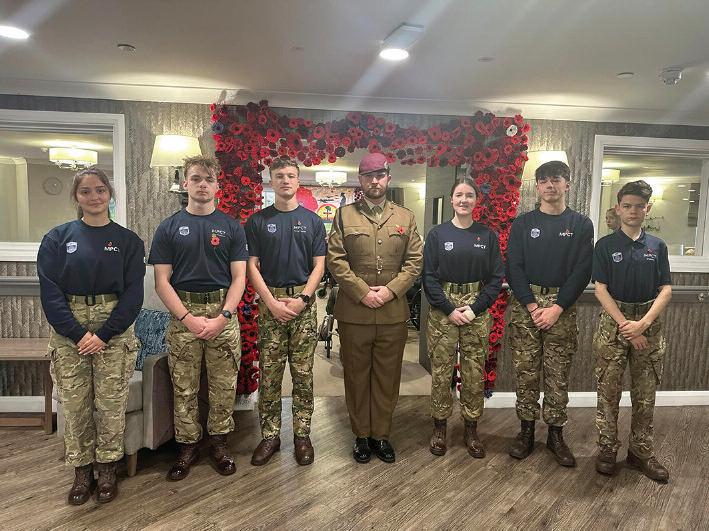
A resident at HC-One s Brize Meadow Lodge Care Home - just a stone s throw away from famous RAF Brize Norton - is sharing his story ahead of this year s Remembrance Day
Brian Montgomery had an extensive career in the Royal Air force that saw him travel the world, reaching the prestigious rank of Warrant Officer before moving to an exciting career at NATO
Recipient of the first ever King Scout Award for Lincolnshire, Brian joined the force in 1951 which saw him deployed in Cyprus Peru and even Iran
At the height of the Cuban Missile Crisis Brian remembers flying in Britain’s iconic Vulcan aircraft recalling the harrowing pressure that both he and his squad members were under and the period of intense work and fear he felt during that time, fearing that him and many of his comrades would not return
Brian Montgomery resident at HC-One s Brize Meadow Lodge Care Home
said:
At the height of intensity of the Cold War we were scheduled to station in Maine USA but we got the call to rush back to New Mexico We were not told why at the time and there was a lot of confusion around what we were flying back to “It was a frightening time; I don’t think I had much time to think about what was happening I get a lot more emotional talking about it now than I ever did back then I think we all just got on with it and got our heads down ”
Brian s work across his deployment led to be invited to Buckingham Palace on January 1, 1980, to receive his MBE award as part of the New Year Honours list, which was the highlight of his career
After his time in the RAF he and his
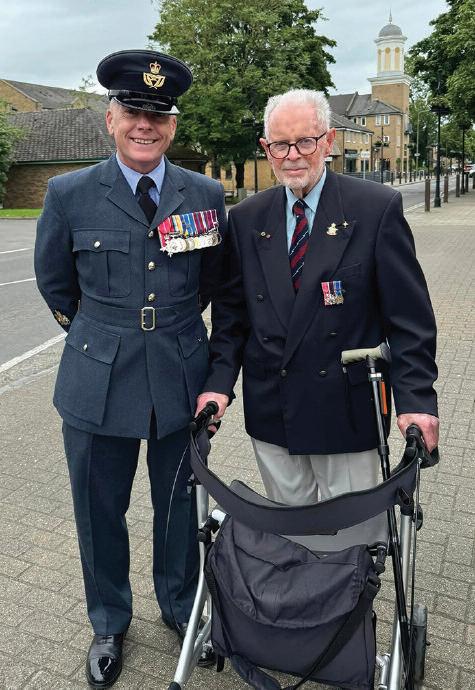

the volunteers felt proud of their work and the Mayor of Wisbech’s reaction had been heart-warming when he came to see the display At points I felt we left it too late to finish it but it s even better than I thought was possible I feel privileged to have helped to create this”
General Manager Paula Colman said:
“We feel proud of the efforts that have gone into this display It s a proud remembrance community here at Hickathrift House and we feel privileged to create this symbol of remembrance It has been really lovely to see different generations getting involved from a 90-year-old resident down to our 13-year-old Duke of Edinburgh volunteer as well as all the family and friends of residents at Hickathrift the staff and volunteers”
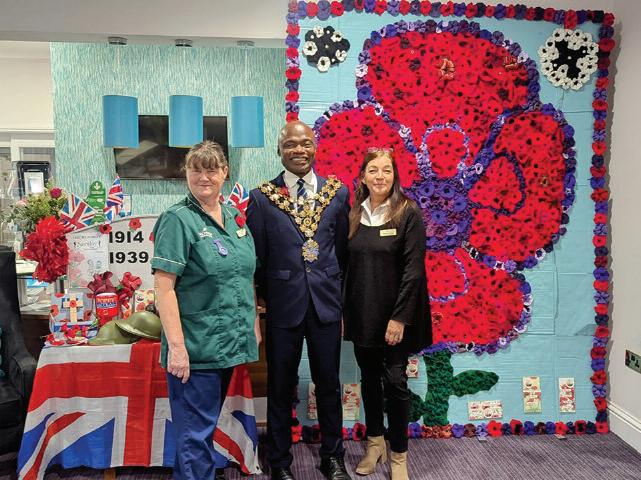
An Army veteran in High Wycombe has finally received a medal in recognition of the dangerous work he undertook 65 years ago, ahead of Remembrance
Michael Mossop received the Nuclear Test Medal after his daughter Sarah applied for it on his behalf
Released in 2022 after years of campaigning by veterans and charities the Nuclear Test Medal is awarded to UK service and civilian personnel and individuals from other nations who served at the locations where the UK atmospheric nuclear tests were conducted between 1952 and 1967
Michael was serving in the Royal Army Pay Corps (RAPC) and was stationed on Christmas Island in 1959 shortly after hydrogen bomb tests had taken place on the South Pacific island Michael who is now living with dementia joined the Army in 1951 and served for 31 years rising to the rank of Lieutenant Colonel
Daughter Sarah said:


“During his time on Christmas Island, he was distressed to see the impact of the tests close up, and he

often spoke of his relief that no more tests were carried out there ”
Sarah said that as teenagers she and her brother would discuss difficult and challenging issues with her dad She said: “He said he saw his role in the Army as a peacekeeper doing things to protect his country He was in his teens during WWII and people he knew died and he was very conscious that we didn’t want to live through another major war He was part of the effort to stop that happening again, and that was a valuable contribution
Sarah said her father was fortunate to not suffer health conditions which have affected other nuclear testing veterans and added: “As a family we are immensely proud of Dad It was nice that we were able to apply for the medal and to remember and commemorate the work he did ahead of Remembrance I think it will mean a lot to him, as the Army was a massive part of his life ”
There have been growing calls for veterans who were exposed to radiation from nuclear tests and their families, to receive compensation
Over Remembrance Day staff and residents across HC-One s care homes took the time to reflect on the remarkable lives of residents who served in the Armed Forces acknowledging their invaluable contributions to our country These men and women now in their twilight years carry stories of courage resilience and dedication that continue to inspire and educate future generations

Across HC-One’s homes, from Rose Court Care Home in Radcliffe Manchester to Brize Meadow Lodge Care Home in West Oxfordshire, veterans continue to share stories of bravery hardship and perseverance HC-One s Rose Court Care
Home resident Daphne Coldridge aged 101 comes from a military background
With her father and brother serving in the army and her husband Kenneth out at sea during the Second World War
Daphine was also doing her bit for the war effort creating essential parts for military aircraft
Sadly Daphne lost her brother during the war and recalls the hardship of the Homefront saving stamps which were used to buy material for her bridesmaids dresses
When describing her experience in the war Daphne Coldridge said:
The food was rationed, and the dried eggs were horrible The noise of the sirens was not nice and I used to watch the bombs falling from the sky The memories of residents at HC-One’s Leighton Court, in Wallasey who lived through WW2 are a testament to the strength of the human spirit during times of unimaginable adversity
Resident Terence Dalton also known as Terry was born at the end of WW2 and grew up in Birkenhead surrounded by bombed out houses Terry was unable to see his father for some years due to him being part of the Navy working in Burma Myanmar who later continued his naval career working on HMS Mersey as a minesweeper Terry recalls seeing his father return along the Mersey into Liverpool docks and living close to British shipbuilding company Cammell Lairds who played a key role in World War I

Rodney HMS Prince of Wales and HMS Ark Royal Terry would sit and watch the workers leaving
day at work and there would be hundreds pouring out from the site
Terry Dalton resident at HC-One s Leighton Court Care Home stated:
I was born a year after the Second World War and my father was in the Navy During
prefabricated houses, and I remember seeing my father’s ship, HMS Mersey, returning to
It was a very worrying time seeing bombed out houses but I am proud to say
man There is a unique connection there “
Leighton Court resident George Price was 11-years-old during the start of WW2 George grew up in Seacombe Wallasey and he revealed that his father was a gunner in WW1
George recalled seeing the River Mersey filled with ships in the docks During this time George and seven other children had the job of delivering the telegrams across Wallasey
He explained that it was “exciting” to deliver them to a soldier camp based in Wallasey Village and also to American Liberty Boat which was stationed in Bidston docks According to George, parties were often held on the boat
Although they had ration books during the war local families could still get meals handed to them from the local community centre in Seacombe
The road Leighton Court Care Home is situated on, Manor Road was one of the biggest areas to take a hit during the war George recalls the police station, park, and houses around were all wiped out which was a terrible site for those living nearby at the time
George Price resident at HC-One’s Leighton Court Care Home said
and
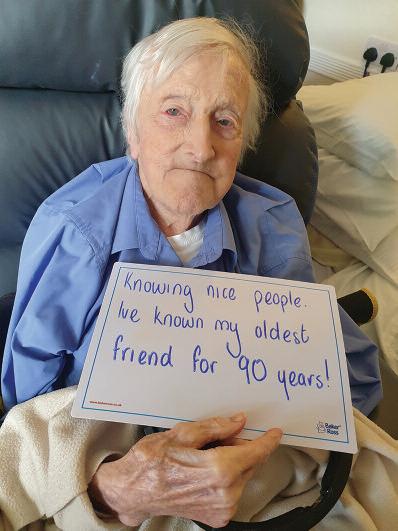
“Sometimes they would throw parties on the American Liberty boat, and


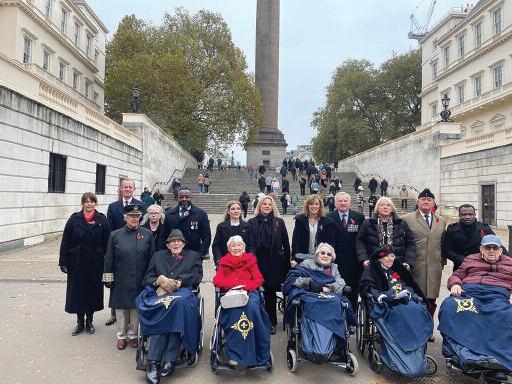
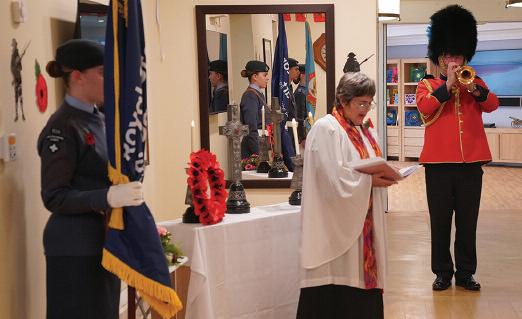
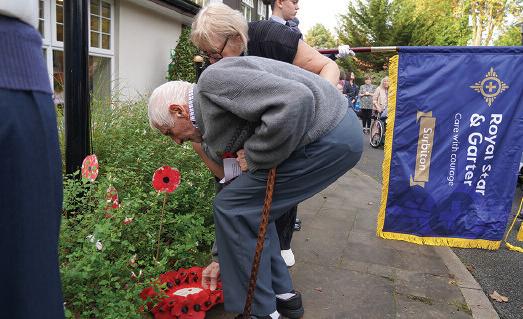



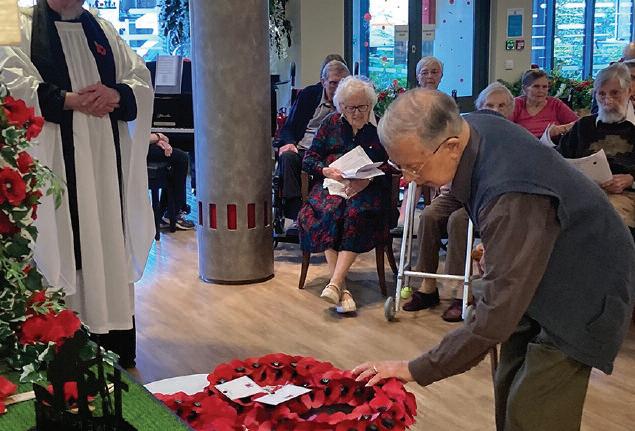





With stories of Queen Victoria climbing their grand oak tree and a rich history which includes hosting historical figures and pioneering medical advancements, Frognal House Care Home is celebrating their 25th birthday as a care home
In celebration of this milestone the care home is hosting a free public event on Friday 15th

Manager of Frognal House
Lisa, who has worked at the care home since June 2024, continued, “Frognal House has seen centuries of change, from royal visits to medical breakthroughs and to be part of that legacy is truly special
We re excited to open our doors to the community and share this remarkable history
Our anniversary celebration is a wonderful opportunity to reflect on how far we’ve come and show our appreciation for the residents, staff and families who make Frognal House a fantastic and welcoming place to live and work ”

and poached pears with a dark chocolate, blackberry, and Chambord sauce
Michelle said It was an absolute honour to be crowned Chef of the Year 2024 The standard of food produced from the other talented chefs was outstanding It is great to hold events like this to showcase the high standards that we produce in our care homes I am so proud to have played a part in this and to inspire up and coming chefs into the business, and for them to be proud that they are a care home chef
Commenting on the event, Aria Care s Hospitality Director James Clear said The standard of dishes presented this year was exceptionally high, making it a very challenging task for the judges We not only considered taste and presentation but also evaluated working practices and skillsets ”
“We are extremely proud of everyone who participated This competition underscores the dedication and passion of our chefs in creating delicious and nutritious meals for our residents Our Hospitality from the Heart framework aims to elevate the resident dining experience emphasising resident-centred nutrition and hydration By investing in fresh local supply chains, providing high-quality equipment and offering comprehensive training we ensure our chefs have everything they need to deliver exceptional nutritious meals daily ”



If you were near Frome Nursing Home on Bonfire Night, you probably saw it; the crowd the queues the excitement that practically radiated from the care home The event kicked off around noon and by the late afternoon the home s grounds were absolutely buzzing Families friends and neighbours wrapped up in scarves and cosy coats were streaming in, clutching hot chocolates and chatting as they strolled around The scent of BBQ filled the air mixing with laughter and happy sounds of everyone catching up
Carrie a care assistant at the home commented I would just like to say ‘wow!’ what an amazing evening In all the time I've worked at Frome Nursing Home I ve never seen so many people Thank you to everyone who worked so hard to make this happen And it was lovely to see so many family members from Catherine House come and join us ” Cars kept arriving people kept streaming in the family members were thrilled by the turnout, but it appeared to be a clear reminder of just how loved Frome Nursing Home and Catherine House Care Home are in the community
There were bustling market stalls prepared by local business in and around Somerset brimming with colourful items like sweets toys and gift bags Guests also enjoyed hot sugared donuts and a delicious BBQ with one guest commenting Thanks it was great! We all enjoyed the night, and that cheese hot dog was a real treat, so tasty!"
As 7pm arrived everyone gathered around for the main event Excited whispers spread through the crowd, with kids perched on shoulders and eyes wide with anticipation Suddenly, the first firework shot up, bursting into a shower of colour The sky filled with reds blues and golds lighting up the night as everyone clapped and cheered together It was pure magic a shared moment that made the chilly night feel warm
One visitor who brought her mum along said later “It was so special to share this moment with her; she loved it Thank you for making this memory That s what this night was all about; creating memories connecting with loved ones, and feeling like part of something special Even those nearby joined in, with one local saying Even my neighbour was watching from the window and said it was a good display!
Once the fireworks wrapped up, people didn’t just rush off Instead, some headed inside for an “afterparty of sorts It was the perfect way to wind down with residents fondly referred to as family members
and friends all reminiscing on the event and enjoying the cosy warmth with a hot chocolate and a cake
Even family members who couldn’t come outside for the fireworks felt the love The team worked tirelessly behind the scenes, making sure everyone was comfortable and included in the spirit of the night Care assistant Margaret shared What an amazing spectacle to see so many people, the smiling faces the interactions; it made my heart leap tonight Thank you to each and every one who made this happen including those who stayed inside to care for those too delicate to be outdoors Just amazing ”
As people finally drifted home the night felt like something truly special Frome

Nursing Home didn t just throw a fireworks event they gave the community a chance to come together to celebrate and to remember what makes Frome feel like home to so many
Sherin the Home s Manager shared her surprise and gratitude after the event: “I never thought tonight would have such a huge turnout My dream of being a chipper was lost in transit when a lovely lady had me remake her burger three times! I couldn t have done this without all of you ” Sherin continued to praise her team giving a special shoutout to Sharon Chard for her coordination skills and to Sarah Kimi and Lauren welcomed new faces and potential family members to the event “I even had job seekers and potential family members making enquiries as I was trying to focus on burgers! she added laughing She also thanked
Luke Martin Jones Garry and Dougie for meeting every request from cutting hedges to clearing trees The team pulled together seamlessly
Frome Nursing Home was thrilled to bring the community together for such a memorable evening and extends heartfelt thanks to everyone who attended, as well as the incredible volunteers and team Special thanks go to those who wrapped up family members warmly for the outdoors and to those who stayed inside, making sure everyone who didn’t wish to come out felt cosy, happy, and comfortable Plans are already underway for more community events that celebrate togetherness and create cherished memories
New CHSA campaign designed to inform buyers and end users of cleaning chemicals of the value of regulations
The Cleaning & Hygiene Suppliers Association has launched a campaign designed to spread the word about the importance of regulations when buying cleaning and hygiene chemicals
Compliance with formal UK Government European Union and industry-standard regulations is essential if buyers are to be certain product claims are legitimate and proven Adherence to regulations guarantee safety They underpin transparency and ensure consistency They support buyers informed decision making by providing a framework for comparison so a buyer really knows if they are getting the product or solution they need They also provide accountability giving buyers a route to recourse if needed In short they underwrite an ethical approach
Buyers and end users can also turn to regulations to be certain they are not misled by environmental claims in the rush toward sustainable solutions
Lorcan Mekitarian Chair of the Cleaning & Hygiene Suppliers Association said: Buyers and end users need to be able to trust the product and sales and marketing claims They need to be certain of the balance between efficacy and sustainability and they need to make sure they are using the right product for the job in hand They are not chemists however so may be misled by seductive sales and marketing messaging

“Our advice is to talk to your manufacturer and ask for evidence to support their claims This will come in the form of their technical data sheets, third party verifications and certifications and, importantly, proof of regulatory compliance ” Gobble-de-gook or undefined phrases to be wary of include: ‘non-renewable chemicals’ ‘chemical-free’ ‘natural’ ‘five times filtered water’ and ‘non-toxic’ ‘Biodegradable’ is also a confusing term As applied to cleaning products it is defined in current legislation (Detergent Regulation (EC) No 648/2004 and corresponding UK post Brexit legislation)
Something claiming to be organic should be certified by for example the Soil Association Net-zero claims should be based on the international net-zero standard (https://sciencebasedtargets org/net-zero) or another reliable third party verified certification
Every member of the CHSA has signed our rigorous Code of Practice, which demands our members trade ethically Amongst other stipulations it requires members to: conduct business dealings in an open honest fair and proper manner and in accordance with the laws rules and regulations of the UK and EU ensure all public statements made by and on behalf of the Member are decent honest and truthful ensure no false or exaggerated claims are made verbally in literature electronically or in any other way • hold and provide evidence on request for product and service claims particularly with reference to legislation certifications and accreditations
The CHSA Code of Practice also includes the Competition & Market’s Authority’s Green Claims Code Its principles are summarised as: Claims must be truthful and accurate
Claims must be clear and unambiguous
Claims must not omit or hide important relevant information
Comparisons must be fair and meaningful
Claims must consider the full life cycle of the product or service
Claims must be substantiated
Finally every member of the CHSA s Accreditation Scheme for manufacturers of cleaning chemicals has signed the CHSA s own ethical marketing code
@CHSACleaning www




mk-hire co uk See the advert on page 19

MOWOOT II – proven solution to chronic constipation without medication
Developed by a team of doctors and other healthcare professionals, MOWOOT II performs gentle abdominal massage to speed up intestinal passage in people experiencing chronic constipation
Clinically proven safe and effective relaxing and sideeffects free MOWOOT II
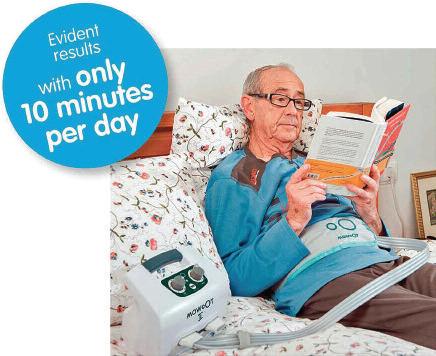
Abdominal Massage Therapy System combats constipation and provides soothing relief to affected people
Easy to use and comfortable the MOWOOT II treats and manages constipation in people with spinal cord injuries multiple sclerosis sufferers Parkinson’s Disease patients and people with constipation related to prescription medication MOWOOT II also helps to relieve idiopathic constipation experienced by menopausal and post-menopausal women


and older and elderly people In clinical studies
MOWOOT II increased evacuation frequency softened stools, improved regularity, reduced gasses relieved bloating and eased off abdominal discomfort 10 to 20 minutes daily of relaxing abdominal massage with MOWOOT II rapidly reduces symptoms of constipation Evident results are experienced only a few days after the first treatment Regular abdominal massage with MOOWOOT II ensures lasting health benefits and better quality of life
MOWOOT II – effective solution to chronic constipation for better quality of life! Supplied



Our Integrity Static Cushions crafted with high-quality materials and innovative design are effective in preventing and managing pressure ulcers by redistributing pressure and minimising skin damage They feature a larger surface area that spreads the user's weight reducing pressure on specific points EasyGo patient lift and transfer chair addresses common issues found in traditional hoists which are often cumbersome and difficult to manoeuvre especially in tight spaces and require multiple staff members EasyGo simplifies the lifting and transferring process enhancing patient dignity and comfort It is designed to move between beds wheelchairs toilets and cars Additionally we have developed a patient transfer seat that can incorporate any Integrity Static Cushion providing optimal pressure relief during transfers

Pressure ulcers are largely preventable with the right approach Our goal is to make your job easier, allowing you to focus on exceptional care and improving residents' quality of life We offer comprehensive product training and support including inperson and online sessions detailed manuals quick-start guides and access to our support team for advice and updates on best practices in pressure ulcer prevention 01457 890 980 | sales@sumed co uk | www sumedinternational com See the advert on the back cover for further information
service

as well as curtains and offers a comprehensive range of shutters
Doug says: “We stock two ranges of silent gliss corded curtain tracks and two ranges of silent gliss uncorded curtain tracks the fitted prices for which are available on this website All of the aluminium silent gliss tracks stock can be shaped and fitted into bay windows, as can some of the poles We also have ready access to many more ranges of both tracks and poles, most of which we can get in one working day “To read more of what our customers say about us please do look us up on Checkatrade checkatrade com/mrtrax
Call now to speak to one of our team on 0800 3345114 or 07968 242004 email us at doug@mrtrax co uk or see the advert on page 8

NCCO International announces the launch of Task Manager an innovative food safety task management and temperature monitoring solution designed for the senior living and residential care home sector Task Manager addresses critical pain points in food safety compliance operational efficiency and resident satisfaction
Task Manager is a game-changer for the senior living industry said Karl Rose Managing Director of NCCO International, "Our system not only ensures compliance with food safety regulations but also enhances the quality of life for residents by guaranteeing safe and nutritious meals
Task Manager assists senior care facilities in adhering to local state, and federal food safety regulations aiming to reduce the risk of foodborne illnesses among elderly residents By providing detailed record-keeping and log management Task Manager supports facilities in maintaining audit readiness facilitating health inspections and compliance checks

Task Manager automates temperature monitoring for refrigerators freezers and food storage areas to help maintain safe limits without manual checks The system organizes food safety-related tasks, such as cleaning schedules equipment maintenance and staff training to help ensure thoroughness With consistent monitoring Task Manager helps maintain the nutritional value and quality of stored and prepared food Real-time alerts for temperature deviations enable quick corrective actions, potentially preventing spoilage and ensuring residents receive high-quality meals For more information about Task Manager please visit www ncco eu or contact David Webster at dwebster@ncco com

By

Malnutrition remains a significant issue in care homes where the elderly are particularly vulnerable As a registered dietitian working in the community and in hospital wards often with elderly people who have experienced fall, I wish more people knew about the prevalence of malnutrition and how to combat it before they ended up in hospital
Recent statistics paint a stark picture: Around one in 10 people over the age of 65 are malnourished or at risk of malnutrition and this figure rises alarmingly to 45% among those in their 90s According to the British Association for Parenteral and Enteral Nutrition (BAPEN) malnutrition costs the UK approximately £23 5 billion annually with older adults being disproportionately affected
As the population ages addressing malnutrition and its associated complications, such as frailty and sarcopenia, becomes ever more critical By focusing on early detection and strategic nutritional interventions, including the use of protein, care homes can play a vital role in safeguarding the health of their residents
SPOTTING THE EARLY SIGNS OF MALNUTRITION
The first step in combating malnutrition is recognizing its early signs
The Malnutrition Universal Screening Tool (MUST) is a valuable resource for this purpose enabling caregivers to systematically assess the risk of malnutrition in residents by considering factors such as Body Mass Index (BMI) unintentional weight loss and the impact of acute illness on nutritional intake
KEY EARLY SIGNS TO MONITOR:
1 Unintentional Weight Loss: A significant early indicator of malnutrition is unintentional weight loss Regularly monitoring residents' weight and comparing it to previous measurements is essential A loss of even 5% of body weight over a few months can signal malnutrition and warrants immediate attention
2 Decreased Appetite: A reduced appetite is often a precursor to malnutrition Residents may skip meals, eat smaller portions, or show a lack of interest in food It s important to understand the reasons behind these changes which could be linked to dental issues depression or medication side effects
3 Physical Changes: Signs such as muscle wasting thinning hair dry skin or dental problems may indicate nutritional deficiencies These physical symptoms are often subtle but crucial indicators of potential malnutrition
4 Fatigue and Weakness: Increased tiredness or difficulty performing daily activities can be related to inadequate nutrition This could also signal the onset of sarcopenia where the loss of muscle mass and strength makes everyday tasks increasingly challenging THE ROLE OF NUTRITION IN PREVENTING AND MANAGING FRAILTY
Frailty a condition characterized by decreased strength endurance and physiological function is closely linked to malnutrition and is a major concern in care homes Proper nutrition is key to preventing and managing frailty particularly through the adequate intake of protein which is essential for maintaining muscle mass and function STRATEGIES FOR NUTRITIONAL INTERVENTIONS:
1 Prioritize Whole Foods: Ensuring a diet rich in whole foods is foundational Protein-rich foods like eggs lean meats, fish, dairy products, and legumes should be emphasized as they not only support muscle
health but also provide essential vitamins and minerals that contribute to overall well-being
2 Incorporate Protein Supplements When Necessary: In cases where residents struggle to meet their protein needs through diet alone perhaps due to a lack of appetite or difficulty chewing protein powders or fortified drinks can be effective These supplements can be easily added to meals snacks or beverages ensuring that residents receive the protein they need without overwhelming them with large portions of food
3 Distribute Protein Throughout the Day: Research shows that distributing protein intake evenly across all meals is more effective for muscle protein synthesis than consuming large amounts at a single meal Caregivers should ensure that residents receive adequate protein at breakfast lunch and dinner to maximize the benefits for muscle maintenance and frailty prevention
ADDRESSING BARRIERS TO ADEQUATE NUTRITION
While boosting protein intake is essential we should also address the barriers that may prevent residents from consuming enough nutrients Factors such as taste preferences difficulties with swallowing, or digestive issues can all impact nutritional intake Caregivers should work closely with dietitians to develop personalized nutrition plans that accommodate these challenges potentially incorporating protein powders and other supplements in palatable and easy-to-digest forms NUTRITION IS KEY TO INCREASING HEALTHSPAN
Malnutrition in care homes is a pressing issue that requires vigilant monitoring and proactive management While the numbers alone tell us the stakes are high intervention is more than about reducing costs The ability to stand up from a chair unaided allows our elderly residents independence By spotting the early signs of malnutrition and implementing strategic nutritional interventions, caregivers can help prevent and manage frailty significantly improving the quality of life for residents By addressing malnutrition and frailty head-on care homes can help residents not only avoid the adverse effects of these conditions but also thrive in their later years

WHAT IS DYSPHAGIA?
Dysphagia is a medical condition that makes swallowing food and drink more difficult Depending on the severity some textures may be more difficult to swallow or somebody may have lost the ability to swallow at all Regardless this can make mealtimes much more difficult, which is why care home caterers must know about this condition and how to support those who have it
A few conditions can cause dysphagia including cancer head injuries a stroke or dementia Age can also play a role in developing this condition meaning there could be a higher likelihood of some residents suffering from this EFFECTS OF DYSPHAGIA
Dysphagia doesn’t just affect mealtimes – it can also: Impact on quality of life: If somebody is no longer able to eat and drink as they ve been able to they may become withdrawn and develop a low mood The change can be difficult to get to grips with which is why supporting residents through their dietary transition and making sure they’re properly catered for is so important
Lead to malnutrition and dehydration: A lack of food and drink due to not being able to swallow or chew properly can mean that residents aren’t properly hydrated or receiving enough nutrition This can result in lower energy levels and in more extreme cases can also lead to further health complications
• Cause choking: Without specialist catering somebody with dysphagia may not be able to swallow their food which can be a choking hazard
FRAMEWORK?
By Rob Henry,
Head of Culinary Solutions and Compliance at EF Group (www ef- group co uk)
dysphagia who have trouble chewing and swallowing Using this framework caterers in the care industry can determine which foods and drinks would be easiest for people with this condition to consume IDDSI consists of eight levels ranging from 0 to 7 with drinks ranging from 0 (thin) to 4 (extremely thick) and foods ranging from 3 (liquidised) to 7 (regular and easy to chew) These indicate the texture and thickness of foods and drinks and give some steer as to which ones would be safest for somebody with dysphagia to consume
ADDITIONAL CONSIDERATIONS FOR CATERING TO
DYSPHAGIA
When you’re preparing to cater for residents with dysphagia there are a few extra things you might need to consider These include:
Training your staff on the IDDSI framework: Ensuring your staff understand the framework what it means and how to apply it is crucial Holding training sessions on this can make sure everybody is on the same page when it comes to catering to the needs of residents with dysphagia
Knowing when to modify the menu to resident needs: Once your team are trained on the IDDSI framework, this must be implemented into your catering practices This should involve assessing each resident’s dietary needs to see if they require modifications and monitoring this over time in case further changes are needed
Getting in the correct nutrients and fluids Alongside modifying diets based on what is easiest for residents to consume you should be ensuring all residents are properly hydrated and receiving a balanced and nutritious diet Whether their food is liquidised, regular or somewhere in between hydration and nutrition must never be reduced even though you might need to alter the way these are offered to residents
Making mealtimes more enjoyable: If somebody has been living with dysphagia without a modified diet they may need some extra encouragement at mealtimes once the modifications have been made Try making mealtimes social introducing different flavours or recipes and regularly rotating menu options to keep them interested and more likely to finish their food
Supporting residents with dysphagia is a key duty of caterers in the care industry and can have a huge impact on their wellbeing, health and quality of life Therefore, it’s vital that your catering team are aware of the signs of the condition and how the IDDSI framework can be used to prescribe a better approach to their mealtimes

Food procurement specialists allmanhall, explore the importance of nutrition and hydration in older people specifically considered for a dignified and person-centric dining experience
Proper nutrition and hydration are critical in care homes directly impacting the health wellbeing and overall quality of life for residents Research by BAPEN reveals that malnutrition affects 35% of care home residents in the UK leading to a variety of health issues including increased infections, poor wound healing mental health decline social isolation and increased frailty This underlines the need for a comprehensive person-centric approach to food and drink in these environments
As people age the risks of malnutrition and dehydration increase compounded by the natural decline in thirst reflex and in some cases cognitive impairments such as dementia These factors make it challenging for older individuals to maintain adequate nutrition and hydration Therefore it s crucial that care home staff adopt a dignified approach to meals, recognising that the involvement in making choices about food remains important even when other capacities are diminished

At a recent National Association of Care Catering (NACC) Seminar care professionals emphasised the significance of creating a positive mealtime experience Engaging residents in conversations about their food preferences understanding their personal histories and ensuring that texture-modified meals are both nutritious and appealing are vital steps in enhancing mealtime satisfaction
Hydration is equally important playing a key role in bodily functions and the prevention of conditions like urinary tract infections and chronic renal disease Strategies to encourage fluid intake include offering a
Our
A belief in the universal right to high-quality delicious nutrition drives us to keep creating and to keep finding ways of helping more people eat real food – regardless of their age lifestyle or health Flavour Creations and Albany Products are pleased to introduce Screamies No-Melt Ice-Scream to the UK dysphagia market
variety of beverages, promoting "hydration hour" with mocktails, and providing high-fluid-content foods like soups and yogurts It s also important to educate care home staff on recognising signs of dehydration which can manifest as tiredness headaches and poor concentration
Nutritionally care homes should focus on nutrient-dense foods rather than calorie-dense ones Incorporating ingredients like eggs seeds, and Greek yogurt can help ensure that residents receive essential nutrients Additionally increasing dietary fibre through foods like whole grains, legumes, and unpeeled fruits can support digestive health and reduce the risk of conditions such as diabetes and heart disease It's important however to introduce fibre gradually to avoid digestive discomfort
For residents with dysphagia a condition that impairs swallowing care homes must offer texture-modified diets that are both safe and nutritious Providing adequate training for staff on preparing these meals, ensuring that they are nutritionally fortified, and enhancing flavours with herbs and spices can make these meals more enjoyable for residents
In conclusion providing a holistic person-centric dining experience in care homes is essential for maintaining the health and dignity of residents By focusing on nutrition hydration and individual preferences care homes can significantly enhance the quality of life for their residents
The mealtime experience is so much more than just food Care establishments across the UK are partnering with allmanhall to manage their food procurement achieve savings and improvements and to access support to enhance the overall dining experience Get in touch – hello@allmanhall co uk
Launched in 2016 SCREAMIES is a brand with one purpose: to deliver the taste of sumptuous old-fashioned ice cream and make it accessible to everyone Each SCREAMIES product is created with a specialised no-melt formula resulting in shelf-stable ice cream products that can be enjoyed by everyone SCREAMIES ice-scream also never gets softer than IDDSI Level 4 making it the perfect treat for those with dysphagia

As well as the traditional three flavours Screamies offers Chocolate and Salted Caramel with added Protein for those with additional nutritional needs With a long shelf life Screamies can be stored at ambient temperature and frozen when the time suits Flavour Creations also offer a wide range of market leading supporting products for those looking to provide something extra to patients Pre-thickened Ready to Drink ranges include in excess of 20 flavour profiles Advital nutritionally complete powder comes flavoured and neutral and is used in snacks like Advital chocolate mousse and Fruits with Attitude Flavour Creations also supply high quality moulds and Shape It to assist with food preparation at all IDDSI levels
To find out more simply contact Albany Products at enquiries@albanyproducts co uk or call on 01706


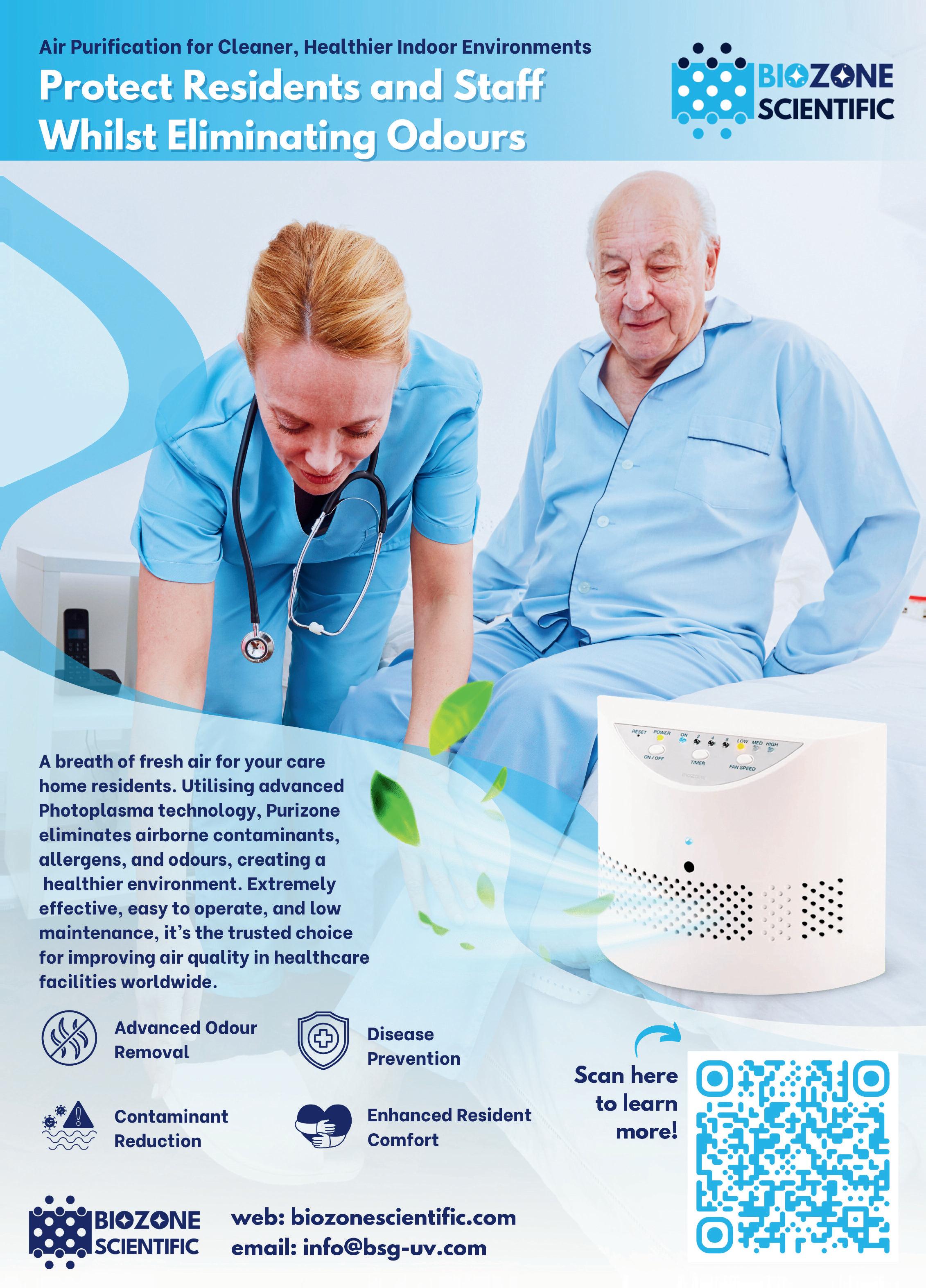



Oxy-Gen
This
Oxy-Gen
All
Carbon
With
See






When




By Scott Williamson, Managing Director,

In the ever-changing and often demanding environment of residential and nursing care homes prioritising the well-being of residents is paramount As care providers it is imperative to explore innovative methods to enhance the quality of life for those in care especially individuals living with cognitive impairments such as dementia One highly impactful method embraced in recent years is sensory stimulation a comprehensive approach that enhances physical, emotional, and cognitive well-being With the integration of advanced AI technology, newer technologies such as personalised, relaxing music videos breathe new life into old black-and-white photos by colourising them accompanied by soothing music captivating landscape visuals and cherished family photos or video messages This provides a distinctive way to deliver a holistic, sensory-enriched experience that significantly benefits elderly residents and those with dementia
DIVERSE FORMS OF SENSORY EXPERIENCES
There are many ways to incorporate sensory experiences into daily care each offering unique benefits for residents
1 Visual Stimulation: Personalised relaxing music videos use serene natural landscapes and family memories to captivate residents' visual senses These familiar images, paired with scenic backdrops evoke positive emotions and comfort Advanced technologies such as AI-powered colourisation of old black-and-white photos bring memories of the past to life enriching the experience further by reconnecting residents with their personal history
2 Auditory Stimulation: The choice of music in these videos is key Rather than familiar music that may evoke specific emotions or memories soothing and non-intrusive sounds are purposefully chosen to enhance deep relaxation and open the senses to help immerse themselves in the visuals and relax without the distraction of nostalgia, allowing for a more profound sensory experience
3 Tactile Stimulation: Personalised videos can be paired with tactile activities to further engage residents Watching these calming visuals while interacting with textured objects fidget blankets or engaging in simple activities like handling soft fabrics can provide enhanced comfort and sensory richness
4 Olfactory Stimulation: While videos alone do not engage the sense of smell pairing them with aromatherapy sessions using calming scents like lavender or invigorating fragrances like citrus can amplify the relaxation experience making it more immersive and holistic
5 Gustatory Stimulation: Taste experiences can also complement sensory videos For example, while watching

THE
personalised landscapes or family-themed videos, residents can engage in taste sessions, trying familiar and comforting flavours adding another dimension to the sensory experience
The implementation of sensory stimulation has wide-reaching benefits that can positively impact residents' emotional, psychological, and physical health Regular sensory activities offer the following advantages:
- Reduction in Agitation and Restlessness: Especially for residents with dementia, these videos create a sense of familiarity and calm reducing anxiety and behavioural issues
- Improved Cognitive Function: Engaging residents’ brains through visual and auditory stimuli helps maintain and in some cases improve cognitive abilities providing meaningful engagement
- Enhanced Communication: Residents who struggle with verbal communication often respond emotionally or cognitively to visual and auditory cues Personalised videos offer alternative ways for residents to express themselves facilitating greater interaction
- Increased Social Interaction: When shared in group settings, these videos encourage social engagement, helping reduce feelings of isolation and loneliness
SENSORY STIMULATION FOR DEMENTIA PATIENTS
For dementia patients sensory stimulation plays a particularly important role in their care Personalised videos offer structure, evoke memories, and facilitate moments of connection between residents and caregivers or family members Combining these videos with other sensory activities such as memory boxes filled with personal items can deepen the experience, triggering memories and meaningful conversation
CREATING SENSORY ROOMS IN CARE HOMES
Many care homes have found success in creating dedicated sensory rooms Personalised relaxing music videos are ideal for use in these spaces where they can be combined with soft lighting calming scents and tactile objects to offer a fully immersive environment These sensory rooms provide a tranquil retreat for residents allowing them to engage multiple senses in a way that is soothing and beneficial
THE POWER OF VISUAL LANDSCAPES FOR SENSORY STIMULATION
Visual landscapes such as nature scenes are an invaluable tool for sensory stimulation For residents who may no longer be able to experience the outdoors firsthand, these videos offer a powerful connection to the natural world Scenes of oceans forests or mountain views have been shown to reduce anxiety alleviate stress and promote mental well-being The immersive quality of these visuals when combined with soothing music provides a window to the outside world offering comfort and emotional enrichment for residents who may feel disconnected from nature
AI TRANSFORMING RESIDENT CARE
The integration of AI into sensory stimulation is revolutionising how care homes approach resident wellbeing AI technologies such as the colourisation of old photographs help residents reconnect with their past in vivid detail These enhanced visuals combined with calming music and personal video messages from loved ones create a multi-sensory experience that reduces anxiety and promotes emotional well-being This innovative use of AI not only improves the sensory experience but also strengthens cognitive function making it an essential tool in modern care homes
THE VALUE OF PHOTOS AND VIDEO MESSAGES FROM LOVED ONES
Incorporating photos and video messages from loved ones adds an emotional layer to sensory stimulation Seeing familiar faces and hearing the voices of family members triggers emotional recognition which can provide comfort and reduce anxiety especially for those experiencing memory loss This personalised approach creates meaningful connections stimulating both visual and auditory pathways and offering moments of joy and clarity for residents
Moreover video messages combat feelings of loneliness and isolation Residents feel a stronger sense of belonging and connection to their loved ones, even if they cannot be physically present This can significantly enhance their overall well-being contributing to a more enriching care environment
SENSORY
Sensory therapy particularly 30-minute video experiences serves as a versatile tool for structured activities With the ability to loop the videos for longer experiences caregivers can find moments of respite while enhancing the well-being of residents Creating a calm and engaged environment through sensory videos can improve the caregiving experience and reduce caregiver burnout
CONCLUSION
The integration of sensory stimulation, particularly through personalised AI-enhanced relaxing music videos offers a transformative approach to improving the well-being of residents in care homes By engaging multiple senses including visual, auditory, tactile, olfactory, and even gustatory, these videos provide a holistic and enriching experience that benefits both residents and caregivers For individuals living with cognitive impairments like dementia these sensory experiences evoke memories reduce anxiety and foster emotional connections
The use of advanced AI technologies such as the colourisation of old photos combined with serene landscapes, soothing music, and messages from loved ones, adds a deeply personal and meaningful dimension to the care environment The implementation of sensory rooms and dedicated sensory activities not only enhances residents' physical and emotional health but also offers caregivers a valuable tool for creating a calm structured environment As care homes continue to evolve embracing sensory therapies will remain essential in promoting a higher quality of life for elderly residents and those living with dementia






By Hervé Chapron, SVP & General Manager EMEA, Semarchy (www semarchy

Safeguarding sensitive data and cybersecurity in the care sector remains a major concern, calling for a high degree of data integrity
Yet a recent report revealed that 30% of CQC registered care provider locations lack up-to-date security measures This alarming statistic highlights the urgent need for a robust data management system to protect devices resident confidentiality clinical outcomes and financial resources
PREVALENCE OF CYBERSECURITY THREATS
Recent statistics on cyber-attacks targeting healthcare and care providers are worrying The European Repository of Cyber Incidents has recorded a significant increase globally with the number of events rising from 32 in 2022 to 121 in 2023 This rise exposes the critical vulnerabilities that care providers face Care England outlines several specific threats including data breaches that involve unauthorised access to resident or staff records leading to identity theft fraud and privacy violations Ransomware attacks are another major threat where malicious software can encrypt critical files, rendering them inaccessible until a ransom is paid
Phishing scams are a further concern as fraudulent emails or messages may trick staff or residents into sharing sensitive information or clicking on malicious links
Cybercriminals can also exploit network vulnerabilities due to weak infrastructure or outdated software and hardware to infiltrate systems Therefore healthcare providers must understand and address these vulnerabilities to prioritise cybersecurity measures and stay vigilant against evolving threats
Equally outdated or insufficient security measures can place some healthcare providers at significant risk of digital exclusion, impacting the care homes future As the world increasingly relies on technology, those who lag in adopting sufficient cyber defences may find themselves left behind PREVENTING DISRUPTIONS
Ransomware attacks and data breaches can incapacitate care facilities Recently in the UK a blood testing centre for the NHS was targeted in a ransomware attack Personal patient data was compromised and there were significant delays in patient care Attacks like these These attacks not only compromise care resident’s confidentiality but can also disrupt essential healthcare services Such disruptions create a domino effect potentially placing numerous lives at risk
Operational efficiency also suffers Care facilities may face hefty fines for not protecting their resident s information plus the costs of restoring data and systems
Ensuring seamless and uninterrupted care services is essential for the well-being of care residents, and the protection of carers as well Secure data systems play a crucial role in maintaining high service quality by enabling continuous healthcare delivery PROTECTING RESIDENT CONFIDENTIALITY
Respecting care resident s privacy rights isn t just an ethical requirement but also a legal obligation
Implementing the following three actions will ensure care facilities comply with both:
• Multi-factor authentication (MFA)
Implementing MFA to your internal system introduces additional security layers, requiring external verification for login access This measure significantly diminishes the risk of unauthorised access as a potential intruder might breach the first security layer but will be stalled at subsequent ones
• Employee Training
Educating staff on data security and best practices such as recognising phishing attempts and crafting secure passwords is crucial This boosts their awareness and minimises human errors that compromise the system
• Data Encr yption
Care providers can add a critical layer of security by encrypting resident data both during transmission (in transit) and while stored (at rest) Encryption renders the data unreadable to unauthorised people protecting sensitive information from potential breaches
ENHANCING CARING OUTCOMES
Care providers who manage multiple facilities can find it challenging to keep up with increasing data volume and complexity from a multitude of sources Knowledge transfer can also be problematic with highsecurity risks There is both the data from the business and the data of care residents that needs to be protected
However with a comprehensive data management system care providers can leverage the power of all data, regardless of source, to ensure data integrity When data is correct and readily available, decisionmakers can rely on it to make well-informed choices that enhance operational efficiency and strategic objectives
Data management systems are indispensable in healthcare for protecting devices securing patient confidentiality, enhancing clinical outcomes, and safeguarding financial resources As cyber threats evolve, the care industry must remain vigilant and consistently update its cybersecurity practices to stay ahead of risks and ensure optimal protection for all stakeholders but most importantly the people they care for




Ensuring




























































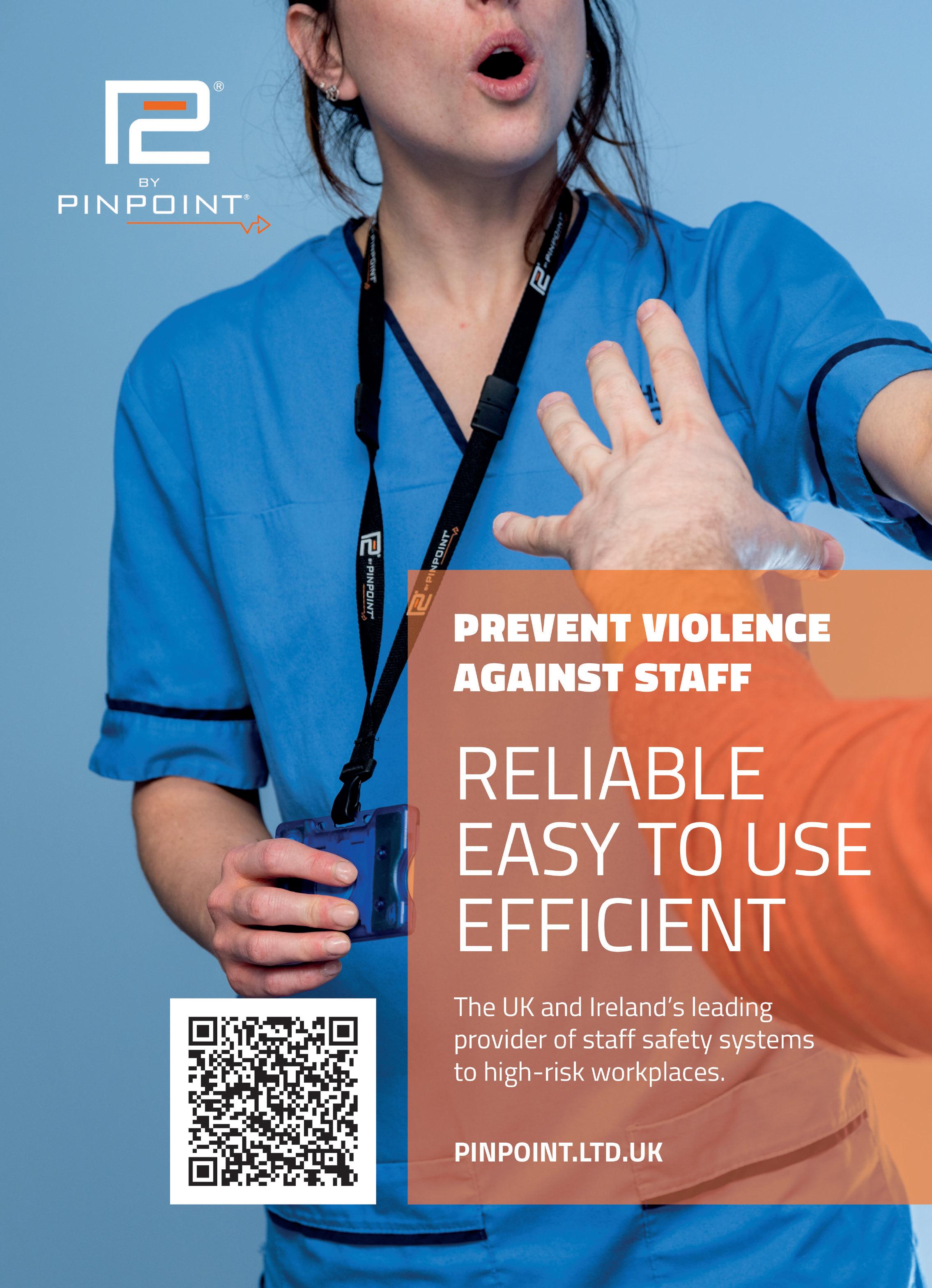




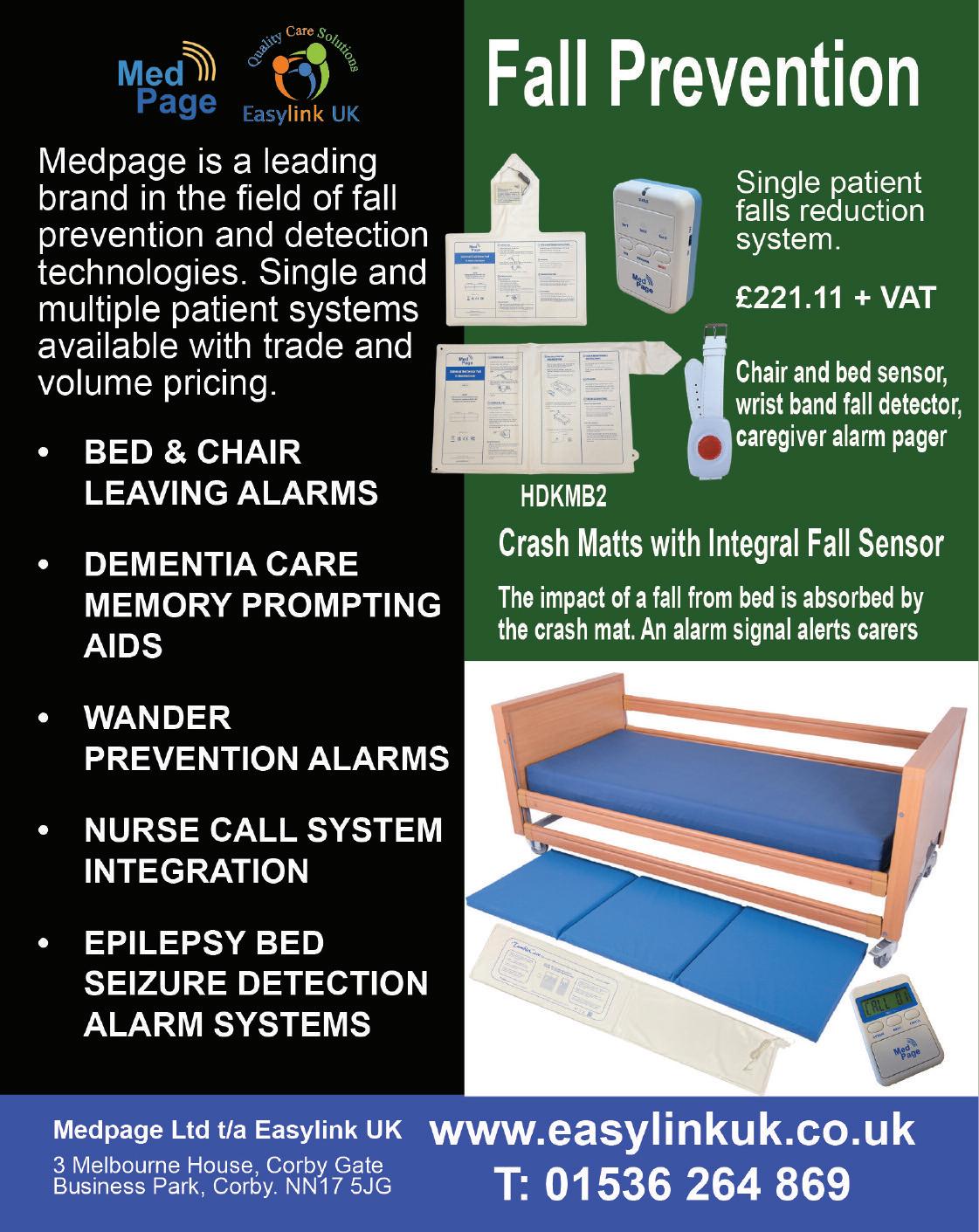


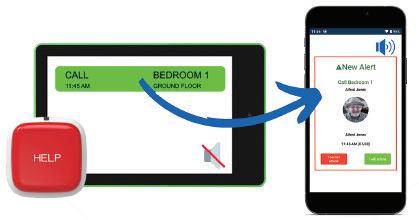


Explore the Char ted Manager Degree Apprenticeship (CMDA) with Mar y Seacole at the University of Exeter
Have you ever wondered about advancing your career, but unsure how to gain the qualifications required whist working? There is an ever-increasing demand for skilled managers within the care sector, and having practical experience is just not enough to fill those positions
Gaining a BSc (Hons) in Responsible Business Manager and

At


Diplomas have the potential to empower individuals and are the best route for most health and social care professionals to progress according to an expert at leading training provider Realise
Lesley O Connor Head of Health and Social Care at Realise said diplomas are a strong option as they are flexible, can usually be fully funded and can be tailored to the particular needs of the employer and the learner
Diplomas are also attractive to employers as they require little administration
Lesley said I think there is still a lack of awareness and some misconceptions around diplomas Sometimes people believe apprenticeships are their only option and they don t realise diplomas are available under funded provision for those who are eligible
“Some employers also mistakenly believe that diplomas are completed entirely online but in fact they are very hands-on and practical This approach helps learners apply theoretical knowledge directly to real-world scenarios, which is a major advantage
“Our diplomas are recognised and trusted by employers in the health and social care sector They meet national standards which means learners hold a qualification that is valued and trusted
“If a candidate does not meet the eligibility criteria for a diploma then alternative routes will need to be explored Otherwise I would nearly always recommend a diploma as a fantastic way to expand knowledge and skills ” Under the Adult Skills Fund diplomas are usually fully funded for anyone aged 19 and over, as long as they have lived in the UK for three years There are some other eligibility requirements in devolved areas – and in some areas workers from overseas can start a diploma as soon as they arrive in the country under a Health and Care Worker visa

Learners can also qualify for funded diplomas if they earn below the low wage threshold which varies from area to area The thresholds have recently been raised in various authorities to £35 000 a year in Liverpool for example and £27 500 a year in West Yorkshire
Realise offers Level 2 diplomas in all non-devolved regions for England and Liverpool City Region
The provider also offers Level
Lesley
“Helping learners find the right programme for them is central to the Realise ethos Some learners will be able to enter at Level 3 if they re in the right job role even if they don’t have another diploma





power of play and peer learning See our advert on the front cover or visit www FocusGames com
Social Care TV continue to fly the flag for highest quality online training for Health and Social Care after unwavering commitment to excellence within the sector for over 25 years
Their widely-used health and social care specific courses - produced and edited in-house - are expertly designed to make learning engaging informative and therefore highly effective for learners
Accredited by CPD and endorsed by Skills for Care, training with Social Care TV is quality assured, comprehensive and relevant
As one of the leading online training providers in the health and social care sector in the UK they supply training for local authorities recruitment agencies care home groups and other health and social care organisations
Their feature-rich Manager platform has further been enhanced this year with the introduction of several new Manager tools designed to aid with compliance reporting and trainee management Features now available include:
Compliance Dashboard with Traffic Light System

and
SCTV regularly
To enhance their learners experience further they have created free, comprehensive subject-specific workbooks which were rolled out across all courses this year This unique addition provides excellent value and a fully robust training package

But
By Daniel O ’Shaughnessy, Programme Manager - Better Security, Better Care, Digital Care Hub

Check
Strengthen
continuity plan: Ensure it covers how you will manage if you were to lose access to data for a period of time Watch out for our new cyber incident response checklist – coming in October for Cyber Security Awareness Month
Create back-ups Identify what data is essential to running your service, and create a backup separate from


Founded

quality

Mike Whitehead CEO of Danforth Care commented: “Since day one our mission has always been to create a home-like atmosphere for our residents that is safe, secure, and encourages independence We are committed to providing the highest quality of care and services to our elderly residents and we strive to create a place where they can be comfortable while feeling respected and valued The support from Warwick and the financial backing they received from OakNorth will help accelerate our growth highlighted by our expectation to open seven further homes in the coming months ”
Deepesh Thakrar, Senior Director of Debt Finance at OakNorth added: “We were delighted to support Warwick on this project as it emphasises our strong ambitions to do more to
seen them

Email:



